Do you REALLY need a business plan?
The top three questions that I get asked most frequently as a professional business plan writer will probably not surprise you:
- What is the purpose of a business plan – why is it really required?
- How is it going to benefit my business if I write a business plan?
- Is a business plan really that important – how can I actually use it?
Keep reading to get my take on what the most essential advantages of preparing a business plan are—and why you may (not) need to prepare one.

The importance, purpose and benefit of a business plan is in that it enables you to validate a business idea, secure funding, set strategic goals – and then take organized action on those goals by making decisions, managing resources, risk and change, while effectively communicating with stakeholders.
Let’s take a closer look at how each of the important business planning benefits can catapult your business forward:

1. Validate Your Business Idea
The process of writing your business plan will force you to ask the difficult questions about the major components of your business, including:
- External: industry, target market of prospective customers, competitive landscape
- Internal: business model, unique selling proposition, operations, marketing, finance
Business planning connects the dots to draw a big picture of the entire business.
And imagine how much time and money you would save if working through a business plan revealed that your business idea is untenable. You would be surprised how often that happens – an idea that once sounded so very promising may easily fall apart after you actually write down all the facts, details and numbers.
While you may be tempted to jump directly into start-up mode, writing a business plan is an essential first step to check the feasibility of a business before investing too much time and money into it. Business plans help to confirm that the idea you are so passionate and convinced about is solid from business point of view.
Take the time to do the necessary research and work through a proper business plan. The more you know, the higher the likelihood that your business will succeed.
2. Set and Track Goals
Successful businesses are dynamic and continuously evolve. And so are good business plans that allow you to:
- Priorities: Regularly set goals, targets (e.g., sales revenues reached), milestones (e.g. number of employees hired), performance indicators and metrics for short, mid and long term
- Accountability: Track your progress toward goals and benchmarks
- Course-correction: make changes to your business as you learn more about your market and what works and what does not
- Mission: Refer to a clear set of values to help steer your business through any times of trouble
Essentially, business plan is a blueprint and an important strategic tool that keeps you focused, motivated and accountable to keep your business on track. When used properly and consulted regularly, it can help you measure and manage what you are working so hard to create – your long-term vision.
As humans, we work better when we have clear goals we can work towards. The everyday business hustle makes it challenging to keep an eye on the strategic priorities. The business planning process serves as a useful reminder.
3. Take Action
A business plan is also a plan of action . At its core, your plan identifies where you are now, where you want your business to go, and how you will get there.
Planning out exactly how you are going to turn your vision into a successful business is perhaps the most important step between an idea and reality. Success comes not only from having a vision but working towards that vision in a systematic and organized way.
A good business plan clearly outlines specific steps necessary to turn the business objectives into reality. Think of it as a roadmap to success. The strategy and tactics need to be in alignment to make sure that your day-to-day activities lead to the achievement of your business goals.
4. Manage Resources
A business plan also provides insight on how resources required for achieving your business goals will be structured and allocated according to their strategic priority. For example:
Large Spending Decisions
- Assets: When and in what amount will the business commit resources to buy/lease new assets, such as computers or vehicles.
- Human Resources: Objectives for hiring new employees, including not only their pay but how they will help the business grow and flourish.
- Business Space: Information on costs of renting/buying space for offices, retail, manufacturing or other operations, for example when expanding to a new location.
Cash Flow It is essential that a business carefully plans and manages cash flows to ensure that there are optimal levels of cash in the bank at all times and avoid situations where the business could run out of cash and could not afford to pay its bills.
Revenues v. Expenses In addition, your business plan will compare your revenue forecasts to the budgeted costs to make sure that your financials are healthy and the business is set up for success.
5. Make Decisions
Whether you are starting a small business or expanding an existing one, a business plan is an important tool to help guide your decisions:
Sound decisions Gathering information for the business plan boosts your knowledge across many important areas of the business:
- Industry, market, customers and competitors
- Financial projections (e.g., revenue, expenses, assets, cash flow)
- Operations, technology and logistics
- Human resources (management and staff)
- Creating value for your customer through products and services
Decision-making skills The business planning process involves thorough research and critical thinking about many intertwined and complex business issues. As a result, it solidifies the decision-making skills of the business owner and builds a solid foundation for strategic planning , prioritization and sound decision making in your business. The more you understand, the better your decisions will be.
Planning Thorough planning allows you to determine the answer to some of the most critical business decisions ahead of time , prepare for anticipate problems before they arise, and ensure that any tactical solutions are in line with the overall strategy and goals.
If you do not take time to plan, you risk becoming overwhelmed by countless options and conflicting directions because you are not unclear about the mission , vision and strategy for your business.
6. Manage Risk
Some level of uncertainty is inherent in every business, but there is a lot you can do to reduce and manage the risk, starting with a business plan to uncover your weak spots.
You will need to take a realistic and pragmatic look at the hard facts and identify:
- Major risks , challenges and obstacles that you can expect on the way – so you can prepare to deal with them.
- Weaknesses in your business idea, business model and strategy – so you can fix them.
- Critical mistakes before they arise – so you can avoid them.
Essentially, the business plan is your safety net . Naturally, business plan cannot entirely eliminate risk, but it can significantly reduce it and prepare you for any challenges you may encounter.
7. Communicate Internally
Attract talent For a business to succeed, attracting talented workers and partners is of vital importance.
A business plan can be used as a communication tool to attract the right talent at all levels, from skilled staff to executive management, to work for your business by explaining the direction and growth potential of the business in a presentable format.
Align performance Sharing your business plan with all team members helps to ensure that everyone is on the same page when it comes to the long-term vision and strategy.
You need their buy-in from the beginning, because aligning your team with your priorities will increase the efficiency of your business as everyone is working towards a common goal .
If everyone on your team understands that their piece of work matters and how it fits into the big picture, they are more invested in achieving the objectives of the business.
It also makes it easier to track and communicate on your progress.
Share and explain business objectives with your management team, employees and new hires. Make selected portions of your business plan part of your new employee training.
8. Communicate Externally
Alliances If you are interested in partnerships or joint ventures, you may share selected sections of your plan with the potential business partners in order to develop new alliances.
Suppliers A business plan can play a part in attracting reliable suppliers and getting approved for business credit from suppliers. Suppliers who feel confident that your business will succeed (e.g., sales projections) will be much more likely to extend credit.
In addition, suppliers may want to ensure their products are being represented in the right way .
Professional Services Having a business plan in place allows you to easily share relevant sections with those you rely on to support the organization, including attorneys, accountants, and other professional consultants as needed, to make sure that everyone is on the same page.
Advisors Share the plan with experts and professionals who are in a position to give you valuable advice.
Landlord Some landlords and property managers require businesses to submit a business plan to be considered for a lease to prove that your business will have sufficient cash flows to pay the rent.
Customers The business plan may also function as a prospectus for potential customers, especially when it comes to large corporate accounts and exclusive customer relationships.
9. Secure Funding
If you intend to seek outside financing for your business, you are likely going to need a business plan.
Whether you are seeking debt financing (e.g. loan or credit line) from a lender (e.g., bank or financial institution) or equity capital financing from investors (e.g., venture or angel capital), a business plan can make the difference between whether or not – and how much – someone decides to invest.
Investors and financiers are always looking at the risk of default and the earning potential based on facts and figures. Understandably, anyone who is interested in supporting your business will want to check that you know what you are doing, that their money is in good hands, and that the venture is viable in the long run.
Business plans tend to be the most effective ways of proving that. A presentation may pique their interest , but they will most probably request a well-written document they can study in detail before they will be prepared to make any financial commitment.
That is why a business plan can often be the single most important document you can present to potential investors/financiers that will provide the structure and confidence that they need to make decisions about funding and supporting your company.
Be prepared to have your business plan scrutinized . Investors and financiers will conduct extensive checks and analyses to be certain that what is written in your business plan faithful representation of the truth.
10. Grow and Change
It is a very common misconception that a business plan is a static document that a new business prepares once in the start-up phase and then happily forgets about.
But businesses are not static. And neither are business plans. The business plan for any business will change over time as the company evolves and expands .
In the growth phase, an updated business plan is particularly useful for:
Raising additional capital for expansion
- Seeking financing for new assets , such as equipment or property
- Securing financing to support steady cash flows (e.g., seasonality, market downturns, timing of sale/purchase invoices)
- Forecasting to allocate resources according to strategic priority and operational needs
- Valuation (e.g., mergers & acquisitions, tax issues, transactions related to divorce, inheritance, estate planning)
Keeping the business plan updated gives established businesses better chance of getting the money they need to grow or even keep operating.
Business plan is also an excellent tool for planning an exit as it would include the strategy and timelines for a transfer to new ownership or dissolution of the company.
Also, if you ever make the decision to sell your business or position yourself for a merger or an acquisition , a strong business plan in hand is going to help you to maximize the business valuation.
Valuation is the process of establishing the worth of a business by a valuation expert who will draw on professional experience as well as a business plan that will outline what you have, what it’s worth now and how much will it likely produce in the future.
Your business is likely to be worth more to a buyer if they clearly understand your business model, your market, your assets and your overall potential to grow and scale .
Related Questions
Business plan purpose: what is the purpose of a business plan.
The purpose of a business plan is to articulate a strategy for starting a new business or growing an existing one by identifying where the business is going and how it will get there to test the viability of a business idea and maximize the chances of securing funding and achieving business goals and success.
Business Plan Benefits: What are the benefits of a business plan?
A business plan benefits businesses by serving as a strategic tool outlining the steps and resources required to achieve goals and make business ideas succeed, as well as a communication tool allowing businesses to articulate their strategy to stakeholders that support the business.
Business Plan Importance: Why is business plan important?
The importance of a business plan lies in it being a roadmap that guides the decisions of a business on the road to success, providing clarity on all aspects of its operations. This blueprint outlines the goals of the business and what exactly is needed to achieve them through effective management.
Sign up for our Newsletter
Get more articles just like this straight into your mailbox.
Related Posts
Recent Posts
Sign up for our newsletter for product updates, new blog posts, and the chance to be featured in our Small Business Spotlight!

The importance of a business plan

Business plans are like road maps: it’s possible to travel without one, but that will only increase the odds of getting lost along the way.
Owners with a business plan see growth 30% faster than those without one, and 71% of the fast-growing companies have business plans . Before we get into the thick of it, let’s define and go over what a business plan actually is.
What is a business plan?
A business plan is a 15-20 page document that outlines how you will achieve your business objectives and includes information about your product, marketing strategies, and finances. You should create one when you’re starting a new business and keep updating it as your business grows.
Rather than putting yourself in a position where you may have to stop and ask for directions or even circle back and start over, small business owners often use business plans to help guide them. That’s because they help them see the bigger picture, plan ahead, make important decisions, and improve the overall likelihood of success.
Why is a business plan important?
A well-written business plan is an important tool because it gives entrepreneurs and small business owners, as well as their employees, the ability to lay out their goals and track their progress as their business begins to grow. Business planning should be the first thing done when starting a new business. Business plans are also important for attracting investors so they can determine if your business is on the right path and worth putting money into.
Business plans typically include detailed information that can help improve your business’s chances of success, like:
- A market analysis : gathering information about factors and conditions that affect your industry
- Competitive analysis : evaluating the strengths and weaknesses of your competitors
- Customer segmentation : divide your customers into different groups based on specific characteristics to improve your marketing
- Marketing: using your research to advertise your business
- Logistics and operations plans : planning and executing the most efficient production process
- Cash flow projection : being prepared for how much money is going into and out of your business
- An overall path to long-term growth
What is the purpose of a business plan?
A business plan is like a map for small business owners, showing them where to go and how to get there. Its main purposes are to help you avoid risks, keep everyone on the same page, plan finances, check if your business idea is good, make operations smoother, and adapt to changes. It's a way for small business owners to plan, communicate, and stay on track toward their goals.
10 reasons why you need a business plan
I know what you’re thinking: “Do I really need a business plan? It sounds like a lot of work, plus I heard they’re outdated and I like figuring things out as I go...”.
The answer is: yes, you really do need a business plan! As entrepreneur Kevin J. Donaldson said, “Going into business without a business plan is like going on a mountain trek without a map or GPS support—you’ll eventually get lost and starve! Though it may sound tedious and time-consuming, business plans are critical to starting your business and setting yourself up for success.
To outline the importance of business plans and make the process sound less daunting, here are 10 reasons why you need one for your small business.
1. To help you with critical decisions
The primary importance of a business plan is that they help you make better decisions. Entrepreneurship is often an endless exercise in decision making and crisis management. Sitting down and considering all the ramifications of any given decision is a luxury that small businesses can’t always afford. That’s where a business plan comes in.
Building a business plan allows you to determine the answer to some of the most critical business decisions ahead of time.
Creating a robust business plan is a forcing function—you have to sit down and think about major components of your business before you get started, like your marketing strategy and what products you’ll sell. You answer many tough questions before they arise. And thinking deeply about your core strategies can also help you understand how those decisions will impact your broader strategy.
Send invoices, estimates, and other docs:
- via links or PDFs
- automatically, via Wave
*While subscribed to Wave’s Pro Plan, get 2.9% + $0 (Visa, Mastercard, Discover) and 3.4% + $0 (Amex) per transaction for the first 10 transactions of each month of your subscription, then 2.9% + $0.60 (Visa, Mastercard, Discover) and 3.4% + $0.60 (Amex) per transaction. Discover processing is only available to US customers. See full terms and conditions for the US and Canada . See Wave’s Terms of Service for more information.
Send invoices, get paid, track expenses, pay your team, and balance your books with our financial management software.
2. To iron out the kinks
Putting together a business plan requires entrepreneurs to ask themselves a lot of hard questions and take the time to come up with well-researched and insightful answers. Even if the document itself were to disappear as soon as it’s completed, the practice of writing it helps to articulate your vision in realistic terms and better determine if there are any gaps in your strategy.
3. To avoid the big mistakes
Only about half of small businesses are still around to celebrate their fifth birthday . While there are many reasons why small businesses fail, many of the most common are purposefully addressed in business plans.
According to data from CB Insights , some of the most common reasons businesses fail include:
- No market need : No one wants what you’re selling.
- Lack of capital : Cash flow issues or businesses simply run out of money.
- Inadequate team : This underscores the importance of hiring the right people to help you run your business.
- Stiff competition : It’s tough to generate a steady profit when you have a lot of competitors in your space.
- Pricing : Some entrepreneurs price their products or services too high or too low—both scenarios can be a recipe for disaster.
The exercise of creating a business plan can help you avoid these major mistakes. Whether it’s cash flow forecasts or a product-market fit analysis , every piece of a business plan can help spot some of those potentially critical mistakes before they arise. For example, don’t be afraid to scrap an idea you really loved if it turns out there’s no market need. Be honest with yourself!
Get a jumpstart on your business plan by creating your own cash flow projection .
4. To prove the viability of the business
Many businesses are created out of passion, and while passion can be a great motivator, it’s not a great proof point.
Planning out exactly how you’re going to turn that vision into a successful business is perhaps the most important step between concept and reality. Business plans can help you confirm that your grand idea makes sound business sense.

A critical component of your business plan is the market research section. Market research can offer deep insight into your customers, your competitors, and your chosen industry. Not only can it enlighten entrepreneurs who are starting up a new business, but it can also better inform existing businesses on activities like marketing, advertising, and releasing new products or services.
Want to prove there’s a market gap? Here’s how you can get started with market research.
5. To set better objectives and benchmarks
Without a business plan, objectives often become arbitrary, without much rhyme or reason behind them. Having a business plan can help make those benchmarks more intentional and consequential. They can also help keep you accountable to your long-term vision and strategy, and gain insights into how your strategy is (or isn’t) coming together over time.
6. To communicate objectives and benchmarks
Whether you’re managing a team of 100 or a team of two, you can’t always be there to make every decision yourself. Think of the business plan like a substitute teacher, ready to answer questions any time there’s an absence. Let your staff know that when in doubt, they can always consult the business plan to understand the next steps in the event that they can’t get an answer from you directly.
Sharing your business plan with team members also helps ensure that all members are aligned with what you’re doing, why, and share the same understanding of long-term objectives.
7. To provide a guide for service providers
Small businesses typically employ contractors , freelancers, and other professionals to help them with tasks like accounting , marketing, legal assistance, and as consultants. Having a business plan in place allows you to easily share relevant sections with those you rely on to support the organization, while ensuring everyone is on the same page.
8. To secure financing
Did you know you’re 2.5x more likely to get funded if you have a business plan?If you’re planning on pitching to venture capitalists, borrowing from a bank, or are considering selling your company in the future, you’re likely going to need a business plan. After all, anyone that’s interested in putting money into your company is going to want to know it’s in good hands and that it’s viable in the long run. Business plans are the most effective ways of proving that and are typically a requirement for anyone seeking outside financing.
Learn what you need to get a small business loan.
9. To better understand the broader landscape
No business is an island, and while you might have a strong handle on everything happening under your own roof, it’s equally important to understand the market terrain as well. Writing a business plan can go a long way in helping you better understand your competition and the market you’re operating in more broadly, illuminate consumer trends and preferences, potential disruptions and other insights that aren’t always plainly visible.
10. To reduce risk
Entrepreneurship is a risky business, but that risk becomes significantly more manageable once tested against a well-crafted business plan. Drawing up revenue and expense projections, devising logistics and operational plans, and understanding the market and competitive landscape can all help reduce the risk factor from an inherently precarious way to make a living. Having a business plan allows you to leave less up to chance, make better decisions, and enjoy the clearest possible view of the future of your company.
Business plan FAQs
How does having a business plan help small business owners make better decisions.
Having a business plan supports small business owners in making smarter decisions by providing a structured framework to assess all parts of their businesses. It helps you foresee potential challenges, identify opportunities, and set clear objectives. Business plans help you make decisions across the board, including market strategies, financial management, resource allocation, and growth planning.
What industry-specific issues can business plans help tackle?
Business plans can address industry-specific challenges like regulatory compliance, technological advancements, market trends, and competitive landscape. For instance, in highly regulated industries like healthcare or finance, a comprehensive business plan can outline compliance measures and risk management strategies.
How can small business owners use their business plans to pitch investors or apply for loans?
In addition to attracting investors and securing financing, small business owners can leverage their business plans during pitches or loan applications by focusing on key elements that resonate with potential stakeholders. This includes highlighting market analysis, competitive advantages, revenue projections, and scalability plans. Presenting a well-researched and data-driven business plan demonstrates credibility and makes investors or lenders feel confident about your business’s potential health and growth.
Understanding the importance of a business plan
Now that you have a solid grasp on the “why” behind business plans, you can confidently move forward with creating your own.
Remember that a business plan will grow and evolve along with your business, so it’s an important part of your whole journey—not just the beginning.
Related Posts
Now that you’ve read up on the purpose of a business plan, check out our guide to help you get started.
The information and tips shared on this blog are meant to be used as learning and personal development tools as you launch, run and grow your business. While a good place to start, these articles should not take the place of personalized advice from professionals. As our lawyers would say: “All content on Wave’s blog is intended for informational purposes only. It should not be considered legal or financial advice.” Additionally, Wave is the legal copyright holder of all materials on the blog, and others cannot re-use or publish it without our written consent.

Hot Summer Savings ☀️ 60% Off for 4 Months. BUY NOW & SAVE
60% Off for 4 Months Buy Now & Save
Wow clients with professional invoices that take seconds to create
Quick and easy online, recurring, and invoice-free payment options
Automated, to accurately track time and easily log billable hours
Reports and tools to track money in and out, so you know where you stand
Easily log expenses and receipts to ensure your books are always tax-time ready
Tax time and business health reports keep you informed and tax-time ready
Automatically track your mileage and never miss a mileage deduction again
Time-saving all-in-one bookkeeping that your business can count on
Track project status and collaborate with clients and team members
Organized and professional, helping you stand out and win new clients
Set clear expectations with clients and organize your plans for each project
Client management made easy, with client info all in one place
Pay your employees and keep accurate books with Payroll software integrations
- Team Management
FreshBooks integrates with over 100 partners to help you simplify your workflows
Send invoices, track time, manage payments, and more…from anywhere.
- Freelancers
- Self-Employed Professionals
- Businesses With Employees
- Businesses With Contractors
- Marketing & Agencies
- Construction & Trades
- IT & Technology
- Business & Prof. Services
- Accounting Partner Program
- Collaborative Accounting™
- Accountant Hub
- Reports Library
- FreshBooks vs QuickBooks
- FreshBooks vs HoneyBook
- FreshBooks vs Harvest
- FreshBooks vs Wave
- FreshBooks vs Xero
- Free Invoice Generator
- Invoice Templates
- Accounting Templates
- Business Name Generator
- Estimate Templates
- Help Center
- Business Loan Calculator
- Mark Up Calculator
Call Toll Free: 1.866.303.6061
1-888-674-3175
- All Articles
- Productivity
- Project Management
- Bookkeeping
Resources for Your Growing Business
The importance of business plan: 5 key reasons.

A key part of any business is its business plan. They can help define the goals of your business and help it reach success. A good business plan can also help you develop an adequate marketing strategy. There are a number of reasons all business owners need business plans, keep reading to learn more!
Here’s What We’ll Cover:
What Is a Business Plan?
5 reasons you need a well-written business plan, how do i make a business plan, key takeaways.
A business plan contains detailed information that can help determine its success. Some of this information can include the following:
- Market analysis
- Cash flow projection
- Competitive analysis
- Financial statements and financial projections
- An operating plan
A solid business plan is a good way to attract potential investors. It can also help you display to business partners that you have a successful business growing. In a competitive landscape, a formal business plan is your key to success.

Check out all of the biggest reasons you need a good business plan below.
1. To Secure Funding
Whether you’re seeking funding from a venture capitalist or a bank, you’ll need a business plan. Business plans are the foundation of a business. They tell the parties that you’re seeking funding from whether or not you’re worth investing in. If you need any sort of outside financing, you’ll need a good business plan to secure it.
2. Set and Communicate Goals
A business plan gives you a tangible way of reviewing your business goals. Business plans revolve around the present and the future. When you establish your goals and put them in writing, you’re more likely to reach them. A strong business plan includes these goals, and allows you to communicate them to investors and employees alike.
3. Prove Viability in the Market
While many businesses are born from passion, not many will last without an effective business plan. While a business concept may seem sound, things may change once the specifics are written down. Often, people who attempt to start a business without a plan will fail. This is because they don’t take into account all of the planning and funds needed to get a business off of the ground.
Market research is a large part of the business planning process. It lets you review your potential customers, as well as the competition, in your field. By understanding both you can set price points for products or services. Sometimes, it may not make sense to start a business based on the existing competition. Other times, market research can guide you to effective marketing strategies that others lack. To have a successful business, it has to be viable. A business plan will help you determine that.
4. They Help Owners Avoid Failure
Far too often, small businesses fail. Many times, this is due to the lack of a strong business plan. There are many reasons that small businesses fail, most of which can be avoided by developing a business plan. Some of them are listed below, which can be avoided by having a business plan:
- The market doesn’t need the business’s product or service
- The business didn’t take into account the amount of capital needed
- The market is oversaturated
- The prices set by the business are too high, pushing potential customers away
Any good business plan includes information to help business owners avoid these issues.

5. Business Plans Reduce Risk
Related to the last reason, business plans help reduce risk. A well-thought-out business plan helps reduce risky decisions. They help business owners make informed decisions based on the research they conduct. Any business owner can tell you that the most important part of their job is making critical decisions. A business plan that factors in all possible situations helps make those decisions.
Luckily, there are plenty of tools available to help you create a business plan. A simple search can lead you to helpful tools, like a business plan template . These are helpful, as they let you fill in the information as you go. Many of them provide basic instructions on how to create the business plan, as well.
If you plan on starting a business, you’ll need a business plan. They’re good for a vast number of things. Business plans help owners make informed decisions, as well as set goals and secure funding. Don’t put off putting together your business plan!
If you’re in the planning stages of your business, be sure to check out our resource hub . We have plenty of valuable resources and articles for you when you’re just getting started. Check it out today!
RELATED ARTICLES

Save Time Billing and Get Paid 2x Faster With FreshBooks
Want More Helpful Articles About Running a Business?
Get more great content in your Inbox.
By subscribing, you agree to receive communications from FreshBooks and acknowledge and agree to FreshBook’s Privacy Policy . You can unsubscribe at any time by contacting us at [email protected].
👋 Welcome to FreshBooks
To see our product designed specifically for your country, please visit the United States site.
The Undeniable Importance of a Business Plan
We often hear about business plans in the context of early-stage companies; however, constructing excellent business plans is difficult and time-consuming, so many entrepreneurs avoid them. But, is this a mistake?
While most people may be aware of the “soft” arguments for and against writing a business plan, in this article, a Toptal Finance Expert takes a data-driven approach to addressing the debate. In it, he finds strong evidence to support the notion that writing an excellent business plan is time well spent.

By Sean Heberling
Sean has analyzed 10,000+ companies, built complex models, and helped facilitate $1+ billion in investment transactions.
PREVIOUSLY AT
Executive Summary
- Individuals who write business plans are 2.5x as likely to start businesses.
- Business planning improves corporate executive satisfaction with corporate strategy development.
- Angels and venture capitalists value business plans and their [financial models](https://www.toptal.com/finance/tutorials/what-is-a-financial-model).
- Companies who complete business plans are 2.5x as likely to get funded.
- Even if a small-scale early-stage venture seeking just $250,000 in capital spent almost $40,000 on business planning and another almost $40,000 on capital raising, it should still expect to "break even" on a probability-weighted basis.
- Larger early-stage ventures enjoy extraordinary probability-weighted returns on investment from business planning. Because the target net capital so greatly exceeds the money spent on business planning, the prospective ROI is huge.
- Company Overview: An explanation of why your company is relevant and the need you are addressing.
- Market Overview: A description of the state of your market and its important trends, a detailed description of your customers, and a description of your current competitors and their advantages.
- Product/Service Overview: A description of your product(s), how they compete with other brands, why they are needed, and why customers will pay a fair economic value for it.
- Financial Projections: Three thorough financial plans with conservative, moderate, and optimistic assumptions.
- The process of writing forces the author to ask introspectively how they reached their conclusions and each of the sub-conclusions along the way because they must explain their logic to a cynical reader.
- The written author needs to support all conclusions with facts and logic to prove that they are not "making it up" or relying upon popular "myths."
- Outlined reports and outlined business plans are not generally subject to the same level of reader scrutiny.
We often hear about business plans in the context of early-stage companies , but constructing excellent business plans is difficult and time-consuming, so many entrepreneurs avoid them. That’s a mistake, as there is strong evidence demonstrating that business plans generate positive returns on time and money invested .
The business world has long debated the importance of business plans, and most involved understand the “soft” arguments. However, this article delves into the data to conclude that writing an excellent business plan is time well spent. I developed a similar view over my 20+ year financial career , during which I have analyzed well over 10,000 different types of companies. I have noticed that while a business plan may not be required for a venture to become successful, having one does seem to greatly improve the probability of successful outcomes.
Expert Opinions Support the Value of Business Planning
Expert opinions support the four following conclusions:
- Angels and venture capitalists value business plans and their financial models.
Individuals Who Write Business Plans Are 2.5x More Likely to Become Entrepreneurs
Many people have business ideas over the course of their careers, but often, these ideas never come to fruition, or they get lost amidst our daily obligations. Interestingly, studies support the notion that those who write business plans are far more likely to launch their companies. Data from the Panal Study of Entrepreneurial Dynamics in fact suggests that business planners were 2.5x as likely to get into business . The study, which surveyed more than 800 people across the United States who were in the process of starting businesses, therefore concluded that “writing a plan greatly increased the chances that a person would actually go into business.”
Of course, causation of this phenomenon is hard to pin down. There are several different possible reasons why this correlation between writing business plans and actually starting a business may exist. But William Gartner, Clemson University Entrepreneurship Professor and author of the Panal Study, believes that “‘research shows that business plans are all about walking the walk. People who write business plans also do more stuff.’ And doing more stuff, such as researching markets and preparing projections, increases the chances an entrepreneur will follow through.”
Research shows that business plans are all about walking the walk. People who write business plans also do more stuff. And doing more stuff, such as researching markets and preparing projections, increases the chances an entrepreneur will follow through.
William Bygrave, a professor emeritus at Babson College, reached a similar conclusion despite having previously shown “that entrepreneurs who began with formal plans had no greater success than those who started without them.” Bygrave does admit, however, that “40% of Babson students who have taken the college’s business plan writing course go on to start businesses after graduation, twice the rate of those who didn’t study plan writing.”
Business Planning Improves Corporate Executive Satisfaction
Another important way in which business plans can provide tangible help is by aligning everyone in an organization with the vision and strategy going forward. And this, in turn, has important ramifications on corporate executive satisfaction. A study by McKinsey & Company which surveyed nearly 800 corporate executives across a range of industries confirms this conclusion. In it, McKinsey found that “formal strategic-planning processes play an important role in improving overall satisfaction with strategy development. That role can be seen in the responses of the 79 percent of managers who claimed that the formal planning process played a significant role in developing strategies and were satisfied with the approach of their companies, compared with only 21 percent of the respondents who felt that the process did not play a significant role. Looked at another way, 51% of the respondents whose companies had no formal process were dissatisfied with their approach to the development of strategy, against only 20% of those at companies with a formal process.”
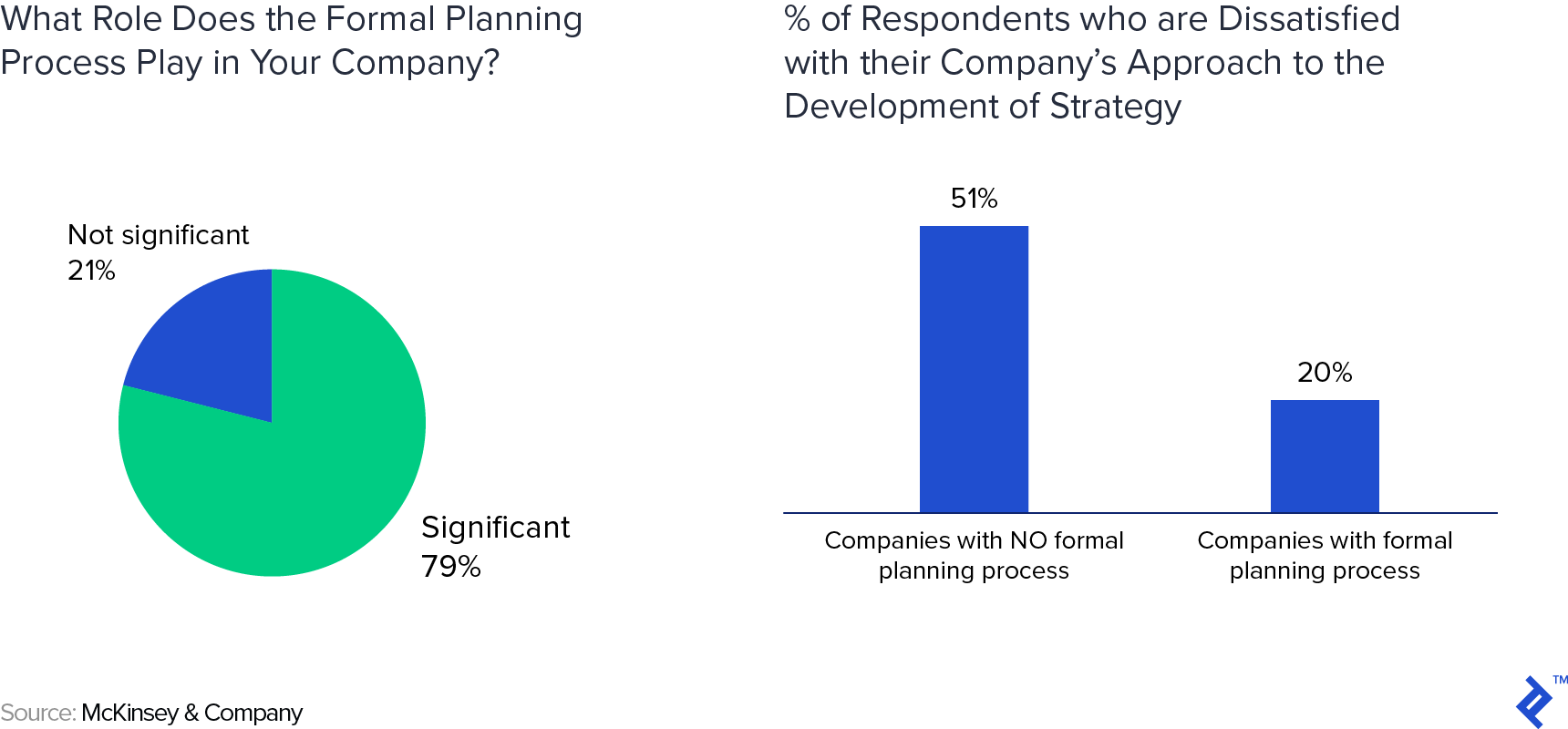
Of course, not all planning is equal. Planning just for the sake of planning doesn’t have the desired effects. As McKinsey itself noted in their study, “Just 45% of the respondents said they were satisfied with the strategic planning process. Moreover, only 23% indicated that major strategic decisions were made within its confines. Given these results, managers might well be tempted to jettison the planning process altogether.” As such, entrepreneurs and business managers should take the time and effort required to put together a well-written and well-researched business plan. Later in the article, I outline some of the elements of a well-written plan.
Business Plans and Their Financial Models Are Valuable to Angels and Venture Capitalists
Many entrepreneurs will eventually need to raise outside capital to grow and develop their businesses. In my experience, a business plan is a crucial tool in maximizing the chances of raising money from external investors. A well-written plan not only helps investors understand your business and your vision, but also shows them that you’ve taken the time to carefully assess and think through the issues your business will face, as well as the more detailed questions surrounding the economics and fundamentals of your business model.
Nathan Beckford, CFA, is the CEO of FounderSuite, the funding stack used by startups in Y Combinator, TechStars, 500s, and more to raise over $750 million. Nathan illustrates the above point nicely in an email he wrote to me recently: “Prior to starting Foundersuite.com, I ran a startup consulting business called VentureArchetypes.com. For the first few years, our primary business was cranking out bold, bullish, beautifully-written business plans for startups to present to investors. Around the mid-2000s, business plans started to go out of favor as the ‘Lean Startup’ methodology became popular. Instead of a written plan, we saw a huge uptick in demand for detailed financial models. Bottom line, I still see value in taking time to be contemplative and strategic before launching a startup. Does that need to be in the form of a 40-page written document? No. But if that’s the format that best works for you, and it can help you model scenarios and ‘see around the corner’ then that’s valuable.”
Nathan and I have frequently interacted, as I maintain a subscription to FounderSuite, software I use when running capital campaigns for early-stage companies on whose boards I sit, or when raising capital for my own firm’s investment projects. Nathan’s feedback is helpful, as he frequently interacts with thousands of entrepreneurs simultaneously running capital campaigns, providing him with a great perspective on which approaches work and which don’t. Clearly, he sees that financial models and business plans in some form help entrepreneurs raise capital.
Companies Who Complete Business Plans Are 2.5x as Likely to Get Funded
Following the section above, naturally, if business plans are useful to outside investors, these are therefore likely to also increase one’s chances of successfully raising capital. A study by Palo Alto Software confirms this hypothesis. The study showed that although 65% of entrepreneurs had NOT completed business plans, the ones who had were twice as likely to have secured funding for their businesses.
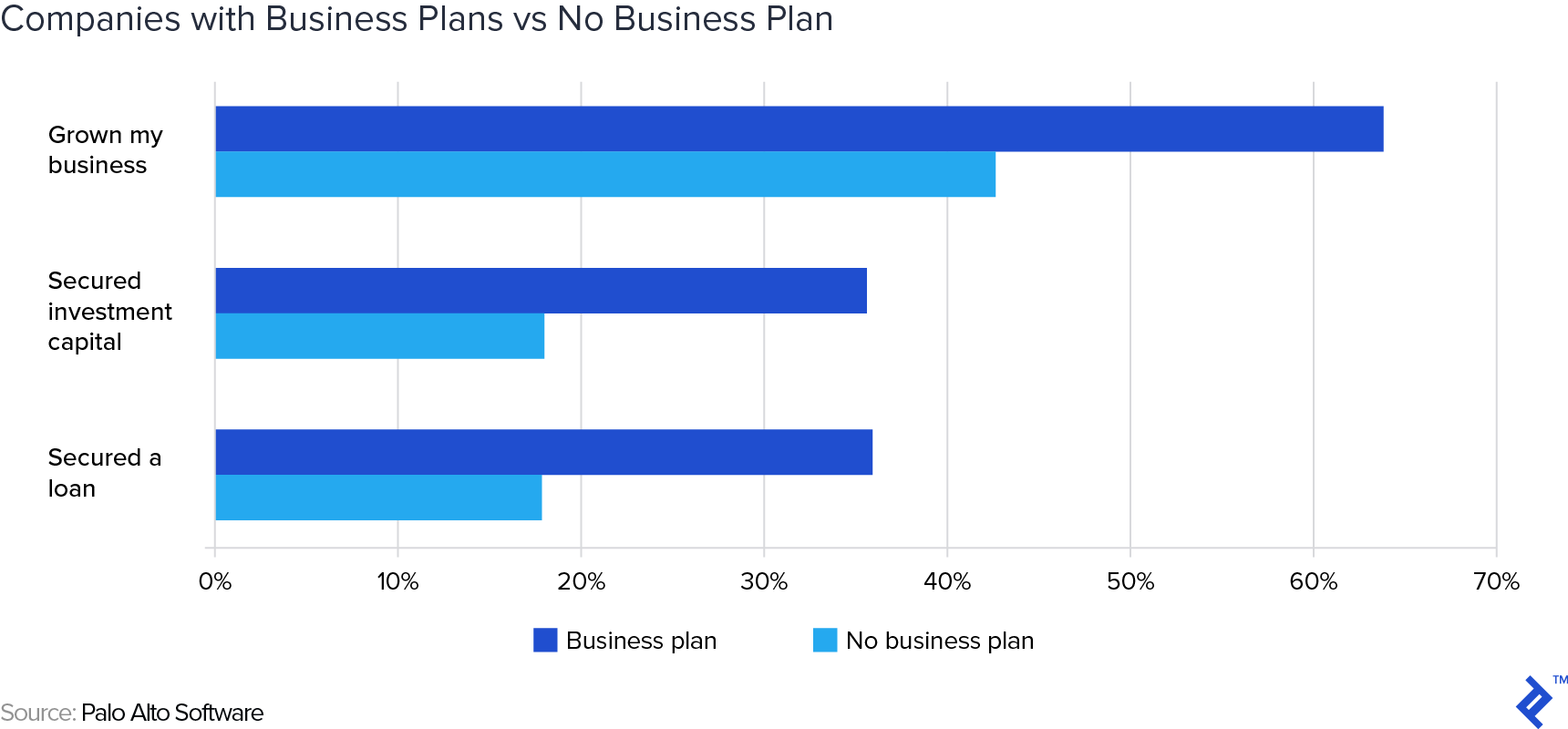
This study surveyed 2,877 entrepreneurs. Of those, 995 had completed business plans, with 297 of them (30%) having secured loans, 280 of them (28%) having secured investment capital, and 499 of them (50%) having grown their businesses. Contrast these percentages with the results for the 1,882 entrepreneurs who had not completed business plans, where just 222 of them (12%) had secured loans, 219 of them (12%) had secured investment capital, and 501 of them (27%) had grown their businesses. (Note that the percentages among the business plan population sum to over 100% because of some overlap between each of the sub-categories.) These results led the study authors to conclude that “Except in a small number of cases, business planning appeared to be positively correlated with business success as measured by our variables. While our analysis cannot say that completing a business plan will lead to success, it does indicate that the type of entrepreneur who completes a business plan is also more likely to run a successful business.”
Calculating the Return on Investment for Business Planning
The data and studies outlined above all serve to prove something that I have come to understand very clearly throughout my career. Nevertheless, I still often find that startups struggle with the idea of having to put together a business plan, and in particular with the option of hiring an outside professional to help them do that. As such, I quantified the ROI of such an activity, using data and numbers based on my many years of business consulting. The results of the exercise are summarized in the table at the end of the section, but there are two overarching conclusions:
- Even a small-scale early-stage company can “afford” to pay a finance expert $191 per hour both to create a business plan and to guide the capital raising process, at worst “breaking even” on the investment.
- Larger early-stage companies can expect significant returns on investments in business planning, perhaps as much as 6,700% (67x the amount of money invested).
Diving into the analysis, my inputs included:
- My professional experience with writing business plans. I have spent 25 - 200 hours apiece creating business plans I feel comfortable sharing with founders, advisors, and investors.
- Data from the Palo Alto study discussed earlier in this article. This study showed that 30% of early-stage ventures with business plans had secured funding, 2.5x as great as the 12% of early-stage ventures without business plans who managed to secure funding despite the absence of such plans.
- The hourly rate for a finance expert x (150 to 200 hours) for one round of financing, OR
- 10% of the amount of capital targeted
My analysis illustrates the following:
- Early-stage companies should expect to spend $4,000 - $40,000 on business planning, including the financial modeling associated with it.
- Early-stage companies should expect to spend $30,000 - $200,000 for an initial round of financing between $250,000 and $2 million in size, resulting in net financing of $200,000 - $1.8 million.
- Even if a small-scale early-stage venture seeking just $250,000 in capital spent almost $40,000 on business planning and another almost $40,000 on capital raising, it should still expect to “break even” on a probability-weighted basis. In other words, because the odds of success with a professional business plan are 2.5x greater than without one, small-scale early-stage ventures can justify such a significant investment. This also assumes NO additional odds for success from engaging a professional to coordinate the fundraising effort. I suspect that doing so may push the odds of success from 12% without a business plan and 30% with a business plan to above 50%. It is also likely that a smaller-scale venture may require significantly fewer hours for business planning and capital raising that what is outlined in the “worst case” below.
- Larger early-stage ventures enjoy extraordinary probability-weighted returns on investment from business planning. Because the target net capital so greatly exceeds the money spent on business planning, the prospective ROI is huge, and this analysis just assumes ONE round of equity financing. Most successful startups will experience several rounds of financing.
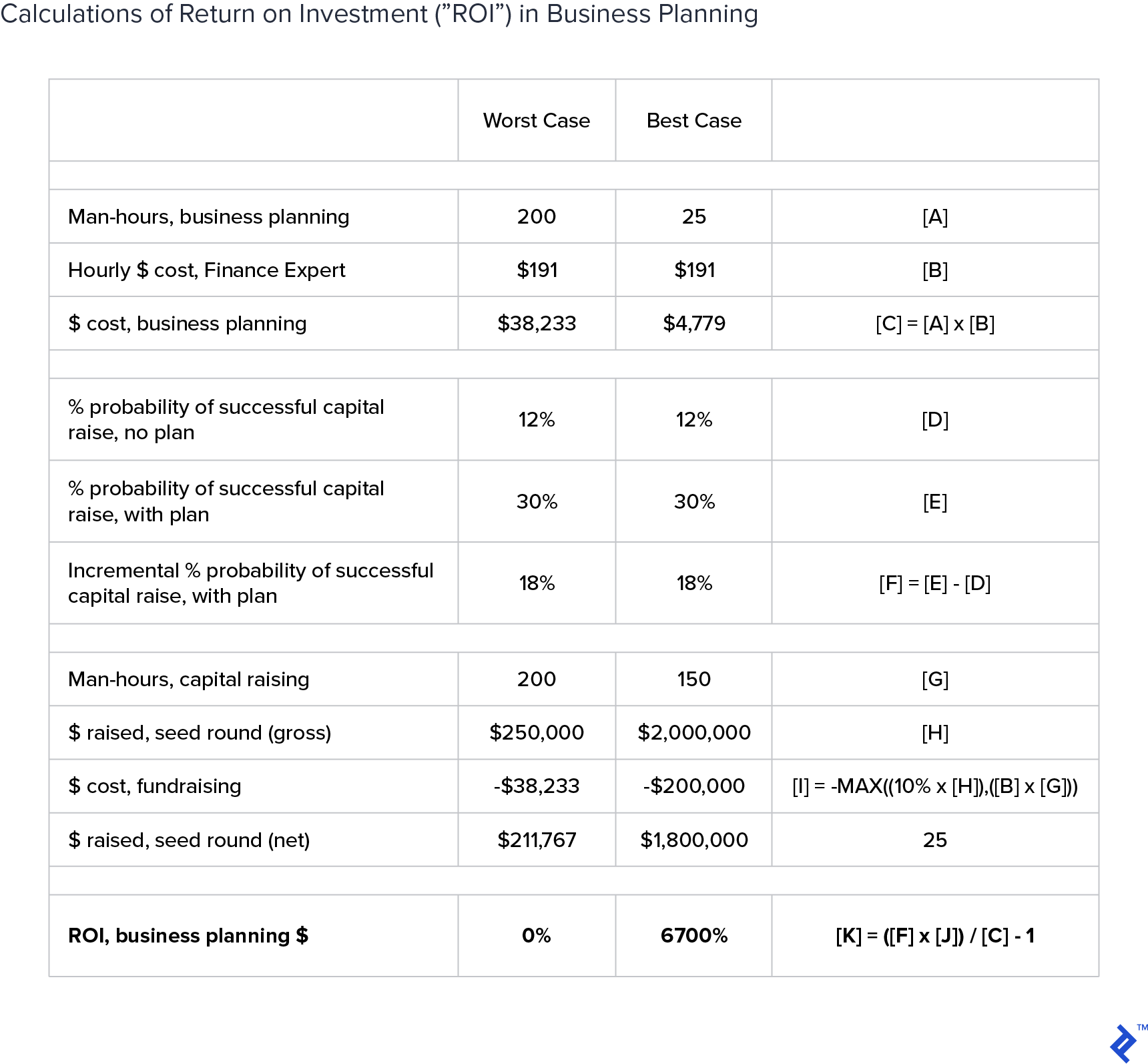
Thoughts on Writing an Excellent Business Plan
An extensive overview of how to write an excellent business plan is beyond the scope of this article. However, here are two key thoughts that have emerged from my years of experience with startups.
First, there are four common elements to an excellent business plan. In Alan Hall’s Forbes article, “ How to Build a Billion Dollar Business Plan: 10 Top Points ,” he interviews Thomas Harrison, Chairman of Diversified Agency Services, an Omnicom division that has purchased “a vast number of firms,” to share his views on the key elements of a great business plan. Although each of these ten elements is essential, I reorganized the list into four broad categories:
1. Company Overview
- An explanation of why your company is relevant and the need are you addressing
- A description of corporate priorities and the processes to achieve them.
- An overview of the various resources, including the people that will be needed, to deliver what’s expected by the customer.
2. Market Overview
- A description of the state of your market and its important trends.
- A detailed description of your customers.
- A description of your current competitors and their advantages. Which ones will you displace?
3. Product/Service Overview
- A description of your products, how they compete with other brands, and why they are needed.
- An explanation of why customers will pay a fair economic value for your product or service. This element is conspicuously absent from some of today’s most expensive unicorns. Companies such as Uber and Tesla are losing massive amounts of money on rapidly growing sales because these companies may not be selling their services/products for fair economic value. Of course, sales grow rapidly when customers can buy your services/products for far less than their fair economic values!
4. Financial Projections
- Conservative
- Each scenario should have realistic and achievable sales, margins, expenses, and profits on monthly, quarterly, and annual bases. Again, these elements appear to be conspicuously absent from some of today’s most expensive unicorns.
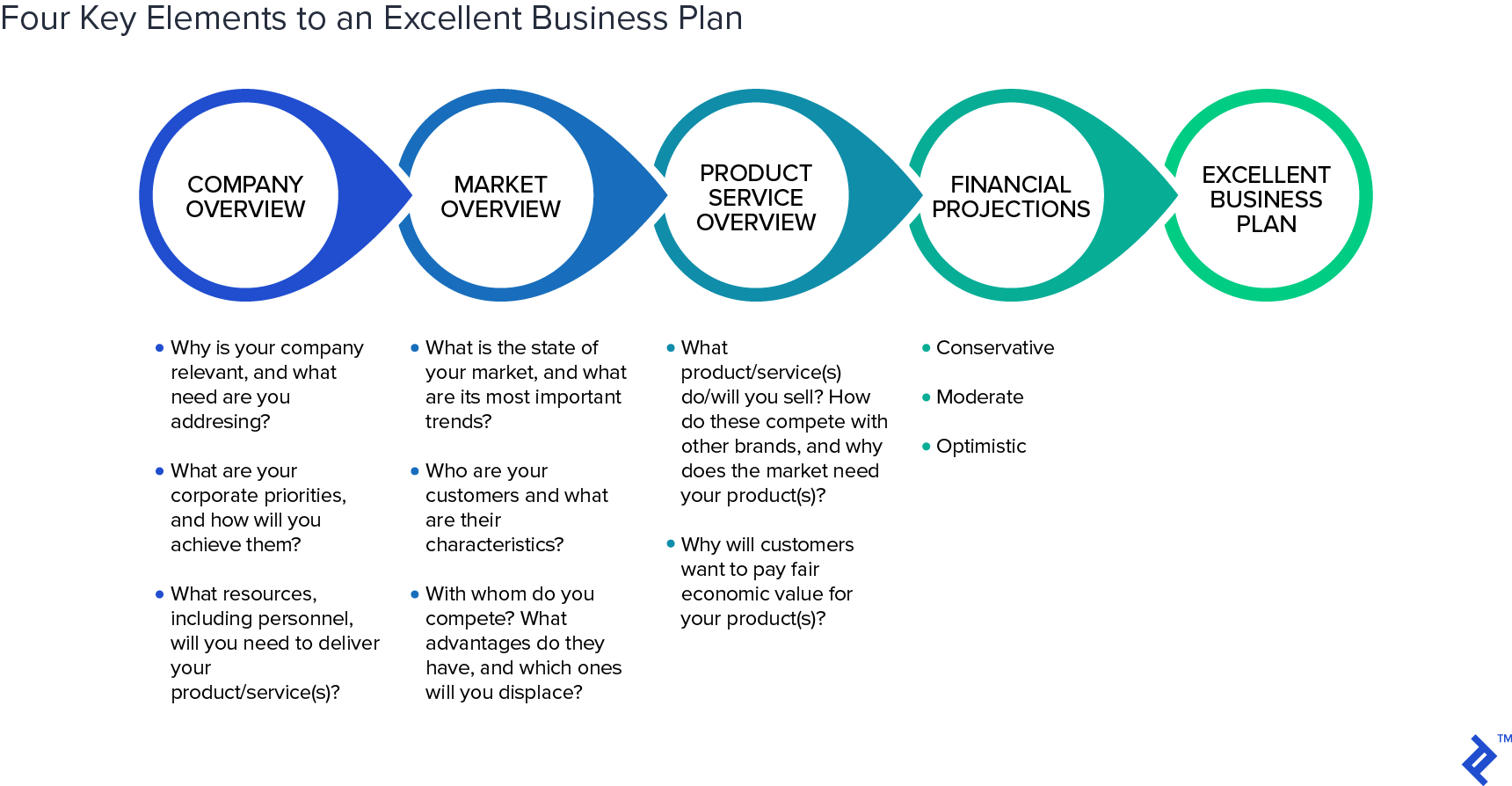
Second, written business plans are superior to those just “outlined.” As an adjunct professor of finance for Villanova University, I require my students to write research reports prior to developing slide decks to present their findings from a full semester of industry research. The process of writing forces the authors to ask themselves how they reached their conclusions and each of the sub-conclusions along the way because they must explain their logic to cynical readers. The written authors need to support their conclusions with facts and logic to prove that they are not “making it up” or relying upon popular “myths.” Outlined reports and outlined business plans are not generally subject to the same level of reader scrutiny. Therefore, written business plans are superior to those just “outlined.” Outlined plans are often kept on 10-12 slide decks, and the slide deck is an important tool in the capital raising process, but the written business plan that stands behind it will differentiate an entrepreneur from their seemingly infinite competition.
Parting Thoughts
Some argue that many public multi-billion-dollar companies such as Apple or Google never had formal business plans before they started, but this argument is flawed because most of these companies likely developed business plans either during the solicitation of venture capital or during the process of going public. Apple and Google were both funded with venture capital, and soliciting venture capital involves business planning. The founders of Apple and Google likely created financial projections and outlined strategic paths.
Moreover, Apple and Google are both public companies, and going public involves business planning. Underwriters employ research analysts creating financial forecasts based on business plans projected by management at the companies going public. Buy-side firms purchasing and holding shares in newly public companies create forecasts based upon the business plans projected by public company management teams.
Admittedly, you don’t need a written business plan to have a successful company. You may not even need a business plan at all to have a successful company. However, the probability of success without a business plan is much lower. Angels and venture capitalists like to know about your business plan, and public companies need to project business plans to persuade underwriters and investors to purchase their securities.
Further Reading on the Toptal Blog:
- Creating a Narrative from Numbers
- Business Plan Consultants: Who They Are and How They Create Value
- Building a Business Continuity Plan
- Building the Next Big Thing: A Guide to Business Idea Development
- Mission Statements: How Effectively Used Intangible Assets Create Corporate Value
Understanding the basics
Why it is important to have a business plan.
Expert opinions and numerous studies show that business plans improve corporate satisfaction, are useful for angel investors and venture capitalists, and increase a company’s chances of raising capital by 2.5x.
What are the benefits of a business plan?
Individuals who write business plans are 2.5x as likely to start businesses. Moreover, business planning improves corporate executive satisfaction with corporate strategy development. Finally, investors value business plans, making the chances of raising capital 2.5x greater.
What does an investor look for in a business plan?
The four key sections of a business plan are: the company overview, a market overview, your product/service overview, and the financial projections.
- BusinessPlan
Sean Heberling
Bryn Mawr, PA, United States
Member since October 18, 2017
About the author
World-class articles, delivered weekly.
By entering your email, you are agreeing to our privacy policy .
Toptal Finance Experts
- Blockchain Consultants
- Business Management Consultants
- Business Plan Consultants
- Business Process Optimization Consultants
- Certified Public Accountants (CPA)
- Economic Development Consultants
- Equity Research Analysts
- Excel Experts
- Financial Benchmarking Consultants
- Financial Forecasting Experts
- Financial Modelers
- Financial Writers
- Fintech Consultants
- FP&A Consultants
- Fractional CFOs
- Fundraising Consultants
- FX Consultants
- Growth Strategy Consultants
- Integrated Business Planning Consultants
- Interim CFOs
- Investment Managers
- Investment Thesis Consultants
- Investor Relations Consultants
- M&A Consultants
- Market Sizing Experts
- Pitch Deck Consultants
- Private Equity Consultants
- Procurement Consultants
- Profitability Analysis Experts
- Real Estate Experts
- Restructuring Consultants
- Risk Management Consultants
- Small Business Consultants
- Supply Chain Management Consultants
- Valuation Specialists
- Venture Capital Consultants
- Virtual CFOs
- Xero Experts
- View More Freelance Finance Experts
Join the Toptal ® community.
Enter your email below to receive occasional updates in your inbox.
- < Back to email setting
What is a Business Plan and Why is it Important?
What is a business plan.
Whether you’re starting a small business or exploring ways to expand an existing one, a business plan is an important tool to help guide your decisions. Think of it as a roadmap to success, providing greater clarity on all aspects of your business, from marketing and finance to operations and product/service details.
While some owners may be tempted to jump directly into startup mode, writing a business plan is a crucial first step for budding entrepreneurs to check the viability of a business before investing too much time or money. The purpose of a business plan is to help articulate a strategy for starting your business. It also provides insight on steps to be taken, resources required for achieving your business goals and a timeline of anticipated results.
In fact, businesses that plan grow 30% faster than those that don’t. 1
For existing small businesses, a business plan should be updated annually as a way to guide growth and navigate the expansion into new markets.
Studies show that nearly 71% of the fastest-growing businesses have business plans, indicating that even existing businesses can benefit from updating their plans. 2
Your plan should include explicit objectives for hiring new employees , market analysis, financial projections, and potential investors. The objectives should indicate how they’ll help your business prosper and grow.
Building an asset management business plan
Committing resources to capital improvements and new assets such as computers, software or cars/trucks is never an easy decision for budget-conscious small business owners. But a business plan can bring clarity to the process of whether to buy or lease and help determine the optimal amount allocated to those assets. A good business plan can also help you decide if it’s feasible to take on additional office, retail or work space.
Creating a marketing strategy
Marketing and market potential are important aspects of a plan for aspiring small businesses.
Getting your business in front of customers on a consistent basis is one of the keys to ensuring your business not only stays afloat but also thrives.
Marketing strategies can be simple, but before you decide on how you will get the word out, getting clear on your target audience and why your business solves their problem can make sticking to your marketing plan easier.
Knowing your unique market positioning can help you determine your messaging. Your marketing strategy should include who your target audience is, the platforms or methods you will connect with them on, and a measurement framework to determine if your efforts are working.
Take entrepreneur Scott Sultzer, who opened Sandwich Joint restaurant in downtown Los Angeles in 2009. “I included the potential marketing demographic of all those who lived in a certain area of the city,” he said of his marketing strategy. “My goal was to capture a certain percentage of all those people who lived and worked nearby.” 4
Created primarily as a marketing tool, Sulzer’s 10-page plan included such topics as target market breakdown, marketing strategy and market penetration. “My business plan was mostly about market projections,” he said. “How are we going to get those people that lead to an increase in our daily sales? And how are we going to reach them to let them know we’re here?” 4
Depending on your business, it’s important to have both brick-and-mortar marketing strategies as well as a plan for marketing your business online .
Seeking investment for your business
In addition to providing a roadmap for progress and a marketing plan , your business plan could also be important in securing funding .
Whether you’re seeking a credit line from a bank or an influx of capital from investors, a business plan that answers questions about profitability and revenue generation can make the difference between whether someone decides to invest – or how much they might choose to invest.
In fact, a study showed that businesses with a plan were more likely to receive formal financial support, such as funding, than businesses without one. 3
Hiring the right talent
A business plan may also be needed to retain other professional services as well, such as attorneys, landlords, consultants or accountants. Sulzer used his business plan to secure a lease.
“I had to have a viable document that they could trust,” said Sulzer, who leased from one of the largest landowners in downtown Los Angeles. 4
“With a corporate landlord, they wouldn’t deal with me unless I had a business plan. I had to submit all my information and a plan that presented what I wanted to do, with financial breakdowns and percentages, demographics, and how I was going to get customers.” 4
For a small business to succeed, attracting talented workers and partners is of vital importance. A part of a business plan for hiring employees is to help bring in the right talent, from the executive level to skilled staff, by showing them the direction and growth potential of the business. It can also help secure vendor accounts, especially with exclusive suppliers.
Setting business plan objectives for management
Finally, a business plan can be important in providing structure and management objectives to a small business. It can become a reference tool to keep management on track with sales targets and operational milestones. When used properly and consulted regularly, it can help you measure and manage what you’re working so hard to create.
Ready to take the next step? Learn how to write a business plan .
Don’t forget to consider insurance coverage in your business plan. When the unexpected happens, you want to make sure your small business is covered. Customized insurance solutions are crucial to protecting and keeping your operation going.
Find out how small business insurance from Nationwide can help you build and protect your business whether you are just starting up or already established.
1 https://www.effectuation.org/wp-content/uploads/2017/06/The-Multiple-Effects-of-Business-Planning-onNew-Venture-Performance-1.pdf , Accessed October 2021. 2 https://onlinelibrary.wiley.com/doi/abs/10.1111/0447-2778.00006 , Accessed October 2021. 3 https://www.tandfonline.com/doi/abs/10.1080/13504851.2014.967377 , Accessed October 2021. 4 Nationwide Interview with Scott Sultzer, 2016.
Disclaimer: The information included is designed for informational purposes only. It is not legal, tax, financial or any other sort of advice, nor is it a substitute for such advice. The information may not apply to your specific situation. We have tried to make sure the information is accurate, but it could be outdated or even inaccurate in parts. It is the reader’s responsibility to comply with any applicable local, state, or federal regulations. Nationwide Mutual Insurance Company, its affiliates and their employees make no warranties about the information nor guarantee of results, and they assume no liability in connection with the information provided. Nationwide, Nationwide is on your side, and the Nationwide N and Eagle are services marks of Nationwide Mutual Insurance Company. © 2021 Nationwide.
- importance of a business plan
- purpose of a business plan
- what is the purpose of a business plan
Related articles
How to sell at a farmers market.
Strolling around the local farmers market on a Saturday morning is a popular pastime, and if you grow, bake, craft, or create things as a hobby, you may have wondered...
10 Tips for Buying a Business Car
Depending on the type of business you own, buying a company car could provide some noteworthy benefits. It might come in handy for deliveries or driving between work locations, and...
How to Start An Online Store
Starting a business is easier than ever thanks to greater online opportunities and the burgeoning “gig economy.” For many people, opening an online store has been a major success. Some...
What is a Business Plan? Definition, Tips, and Templates
Published: June 07, 2023
In an era where more than 20% of small enterprises fail in their first year, having a clear, defined, and well-thought-out business plan is a crucial first step for setting up a business for long-term success.

Business plans are a required tool for all entrepreneurs, business owners, business acquirers, and even business school students. But … what exactly is a business plan?

In this post, we'll explain what a business plan is, the reasons why you'd need one, identify different types of business plans, and what you should include in yours.
What is a business plan?
A business plan is a documented strategy for a business that highlights its goals and its plans for achieving them. It outlines a company's go-to-market plan, financial projections, market research, business purpose, and mission statement. Key staff who are responsible for achieving the goals may also be included in the business plan along with a timeline.
The business plan is an undeniably critical component to getting any company off the ground. It's key to securing financing, documenting your business model, outlining your financial projections, and turning that nugget of a business idea into a reality.
What is a business plan used for?
The purpose of a business plan is three-fold: It summarizes the organization’s strategy in order to execute it long term, secures financing from investors, and helps forecast future business demands.
Business Plan Template [ Download Now ]

Working on your business plan? Try using our Business Plan Template . Pre-filled with the sections a great business plan needs, the template will give aspiring entrepreneurs a feel for what a business plan is, what should be in it, and how it can be used to establish and grow a business from the ground up.
Purposes of a Business Plan
Chances are, someone drafting a business plan will be doing so for one or more of the following reasons:
1. Securing financing from investors.
Since its contents revolve around how businesses succeed, break even, and turn a profit, a business plan is used as a tool for sourcing capital. This document is an entrepreneur's way of showing potential investors or lenders how their capital will be put to work and how it will help the business thrive.
All banks, investors, and venture capital firms will want to see a business plan before handing over their money, and investors typically expect a 10% ROI or more from the capital they invest in a business.
Therefore, these investors need to know if — and when — they'll be making their money back (and then some). Additionally, they'll want to read about the process and strategy for how the business will reach those financial goals, which is where the context provided by sales, marketing, and operations plans come into play.
2. Documenting a company's strategy and goals.
A business plan should leave no stone unturned.
Business plans can span dozens or even hundreds of pages, affording their drafters the opportunity to explain what a business' goals are and how the business will achieve them.
To show potential investors that they've addressed every question and thought through every possible scenario, entrepreneurs should thoroughly explain their marketing, sales, and operations strategies — from acquiring a physical location for the business to explaining a tactical approach for marketing penetration.
These explanations should ultimately lead to a business' break-even point supported by a sales forecast and financial projections, with the business plan writer being able to speak to the why behind anything outlined in the plan.
.webp)
Free Business Plan Template
The essential document for starting a business -- custom built for your needs.
- Outline your idea.
- Pitch to investors.
- Secure funding.
- Get to work!
Download Free
All fields are required.
You're all set!
Click this link to access this resource at any time.
Free Business Plan [Template]
Fill out the form to access your free business plan., 3. legitimizing a business idea..
Everyone's got a great idea for a company — until they put pen to paper and realize that it's not exactly feasible.
A business plan is an aspiring entrepreneur's way to prove that a business idea is actually worth pursuing.
As entrepreneurs document their go-to-market process, capital needs, and expected return on investment, entrepreneurs likely come across a few hiccups that will make them second guess their strategies and metrics — and that's exactly what the business plan is for.
It ensures an entrepreneur's ducks are in a row before bringing their business idea to the world and reassures the readers that whoever wrote the plan is serious about the idea, having put hours into thinking of the business idea, fleshing out growth tactics, and calculating financial projections.
4. Getting an A in your business class.
Speaking from personal experience, there's a chance you're here to get business plan ideas for your Business 101 class project.
If that's the case, might we suggest checking out this post on How to Write a Business Plan — providing a section-by-section guide on creating your plan?
What does a business plan need to include?
- Business Plan Subtitle
- Executive Summary
- Company Description
- The Business Opportunity
- Competitive Analysis
- Target Market
- Marketing Plan
- Financial Summary
- Funding Requirements
1. Business Plan Subtitle
Every great business plan starts with a captivating title and subtitle. You’ll want to make it clear that the document is, in fact, a business plan, but the subtitle can help tell the story of your business in just a short sentence.
2. Executive Summary
Although this is the last part of the business plan that you’ll write, it’s the first section (and maybe the only section) that stakeholders will read. The executive summary of a business plan sets the stage for the rest of the document. It includes your company’s mission or vision statement, value proposition, and long-term goals.
3. Company Description
This brief part of your business plan will detail your business name, years in operation, key offerings, and positioning statement. You might even add core values or a short history of the company. The company description’s role in a business plan is to introduce your business to the reader in a compelling and concise way.
4. The Business Opportunity
The business opportunity should convince investors that your organization meets the needs of the market in a way that no other company can. This section explains the specific problem your business solves within the marketplace and how it solves them. It will include your value proposition as well as some high-level information about your target market.
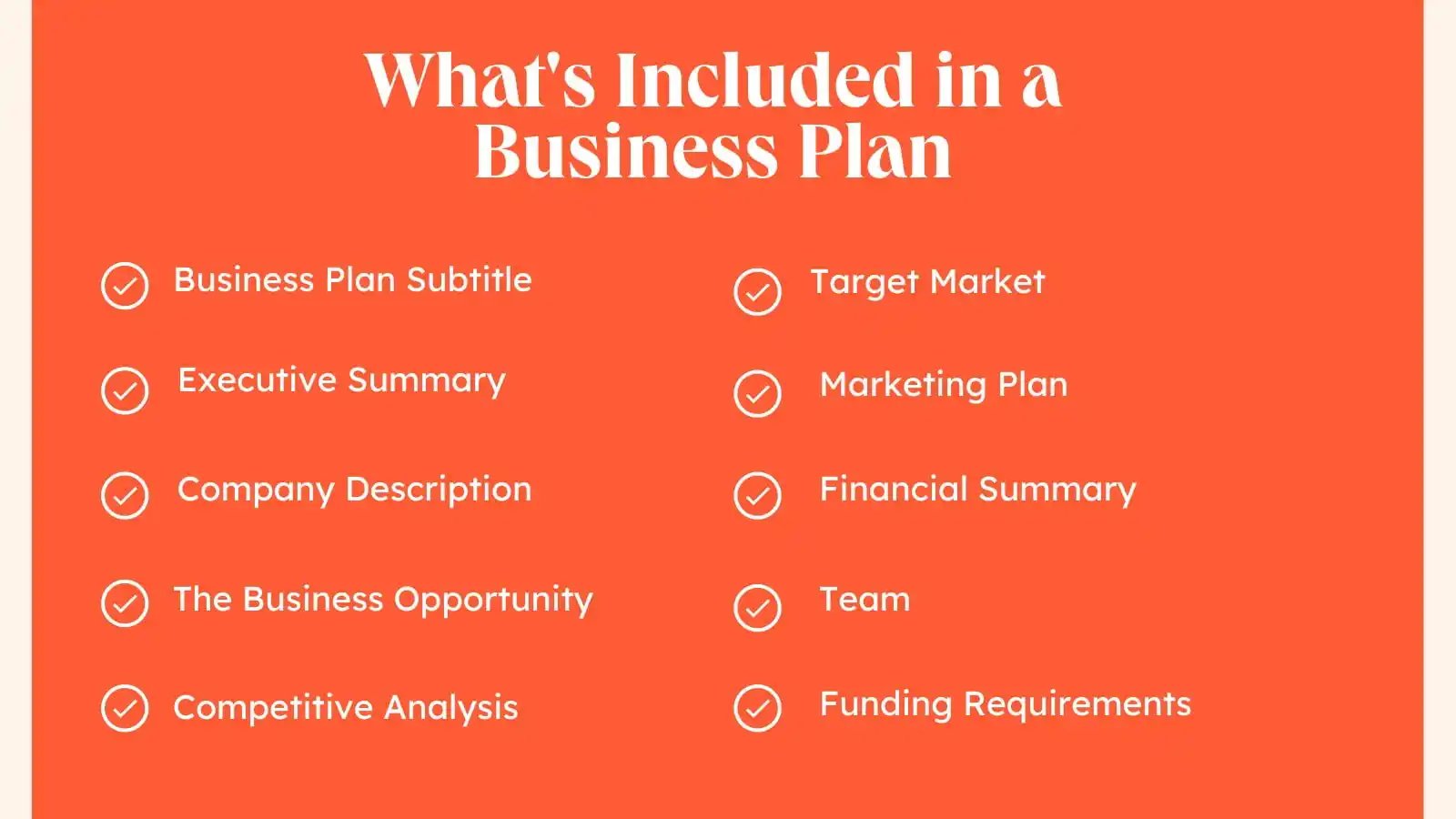
5. Competitive Analysis
Just about every industry has more than one player in the market. Even if your business owns the majority of the market share in your industry or your business concept is the first of its kind, you still have competition. In the competitive analysis section, you’ll take an objective look at the industry landscape to determine where your business fits. A SWOT analysis is an organized way to format this section.
6. Target Market
Who are the core customers of your business and why? The target market portion of your business plan outlines this in detail. The target market should explain the demographics, psychographics, behavioristics, and geographics of the ideal customer.
7. Marketing Plan
Marketing is expansive, and it’ll be tempting to cover every type of marketing possible, but a brief overview of how you’ll market your unique value proposition to your target audience, followed by a tactical plan will suffice.
Think broadly and narrow down from there: Will you focus on a slow-and-steady play where you make an upfront investment in organic customer acquisition? Or will you generate lots of quick customers using a pay-to-play advertising strategy? This kind of information should guide the marketing plan section of your business plan.
8. Financial Summary
Money doesn’t grow on trees and even the most digital, sustainable businesses have expenses. Outlining a financial summary of where your business is currently and where you’d like it to be in the future will substantiate this section. Consider including any monetary information that will give potential investors a glimpse into the financial health of your business. Assets, liabilities, expenses, debt, investments, revenue, and more are all useful adds here.
So, you’ve outlined some great goals, the business opportunity is valid, and the industry is ready for what you have to offer. Who’s responsible for turning all this high-level talk into results? The "team" section of your business plan answers that question by providing an overview of the roles responsible for each goal. Don’t worry if you don’t have every team member on board yet, knowing what roles to hire for is helpful as you seek funding from investors.
10. Funding Requirements
Remember that one of the goals of a business plan is to secure funding from investors, so you’ll need to include funding requirements you’d like them to fulfill. The amount your business needs, for what reasons, and for how long will meet the requirement for this section.
Types of Business Plans
- Startup Business Plan
- Feasibility Business Plan
- Internal Business Plan
- Strategic Business Plan
- Business Acquisition Plan
- Business Repositioning Plan
- Expansion or Growth Business Plan
There’s no one size fits all business plan as there are several types of businesses in the market today. From startups with just one founder to historic household names that need to stay competitive, every type of business needs a business plan that’s tailored to its needs. Below are a few of the most common types of business plans.
For even more examples, check out these sample business plans to help you write your own .
1. Startup Business Plan
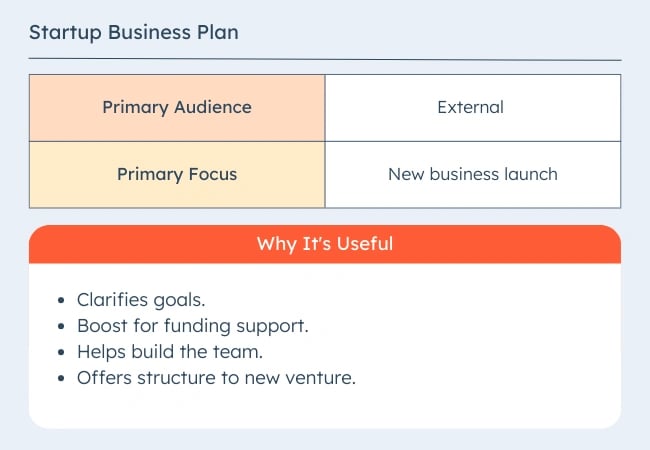
As one of the most common types of business plans, a startup business plan is for new business ideas. This plan lays the foundation for the eventual success of a business.
The biggest challenge with the startup business plan is that it’s written completely from scratch. Startup business plans often reference existing industry data. They also explain unique business strategies and go-to-market plans.
Because startup business plans expand on an original idea, the contents will vary by the top priority goals.
For example, say a startup is looking for funding. If capital is a priority, this business plan might focus more on financial projections than marketing or company culture.
2. Feasibility Business Plan
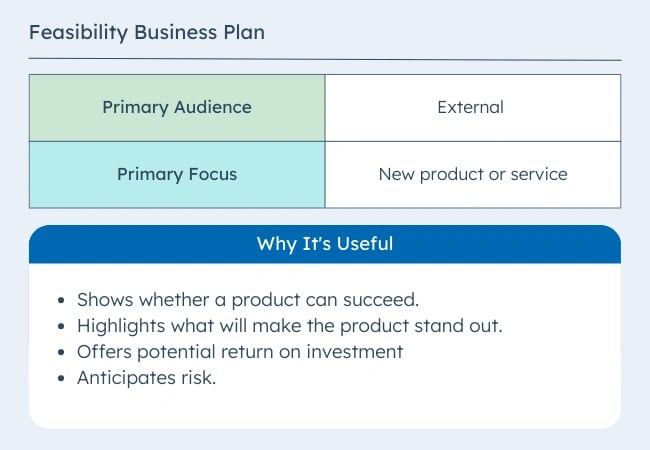
This type of business plan focuses on a single essential aspect of the business — the product or service. It may be part of a startup business plan or a standalone plan for an existing organization. This comprehensive plan may include:
- A detailed product description
- Market analysis
- Technology needs
- Production needs
- Financial sources
- Production operations
According to CBInsights research, 35% of startups fail because of a lack of market need. Another 10% fail because of mistimed products.
Some businesses will complete a feasibility study to explore ideas and narrow product plans to the best choice. They conduct these studies before completing the feasibility business plan. Then the feasibility plan centers on that one product or service.
3. Internal Business Plan
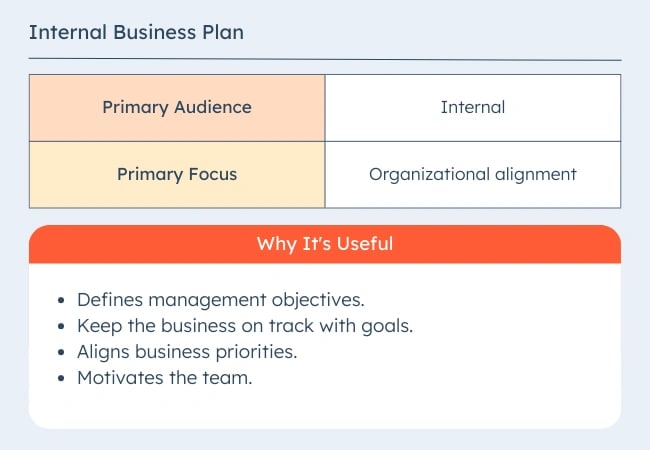
Internal business plans help leaders communicate company goals, strategy, and performance. This helps the business align and work toward objectives more effectively.
Besides the typical elements in a startup business plan, an internal business plan may also include:
- Department-specific budgets
- Target demographic analysis
- Market size and share of voice analysis
- Action plans
- Sustainability plans
Most external-facing business plans focus on raising capital and support for a business. But an internal business plan helps keep the business mission consistent in the face of change.
4. Strategic Business Plan
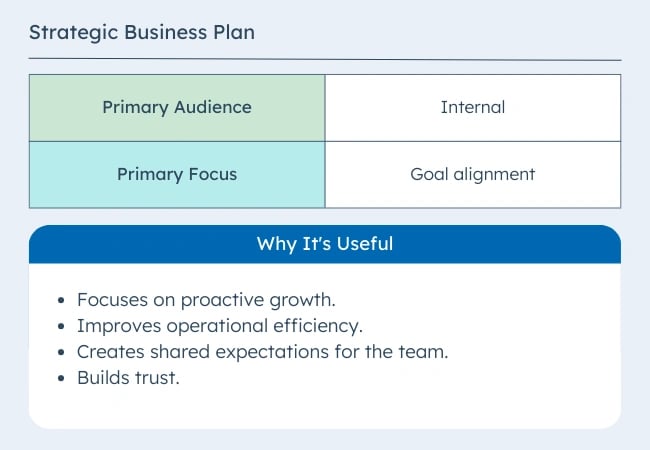
Strategic business plans focus on long-term objectives for your business. They usually cover the first three to five years of operations. This is different from the typical startup business plan which focuses on the first one to three years. The audience for this plan is also primarily internal stakeholders.
These types of business plans may include:
- Relevant data and analysis
- Assessments of company resources
- Vision and mission statements
It's important to remember that, while many businesses create a strategic plan before launching, some business owners just jump in. So, this business plan can add value by outlining how your business plans to reach specific goals. This type of planning can also help a business anticipate future challenges.
5. Business Acquisition Plan
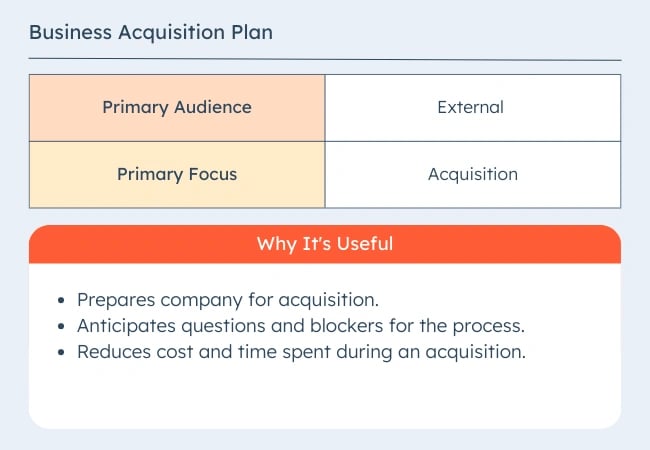
Investors use business plans to acquire existing businesses, too — not just new businesses.
A business acquisition plan may include costs, schedules, or management requirements. This data will come from an acquisition strategy.
A business plan for an existing company will explain:
- How an acquisition will change its operating model
- What will stay the same under new ownership
- Why things will change or stay the same
- Acquisition planning documentation
- Timelines for acquisition
Additionally, the business plan should speak to the current state of the business and why it's up for sale.
For example, if someone is purchasing a failing business, the business plan should explain why the business is being purchased. It should also include:
- What the new owner will do to turn the business around
- Historic business metrics
- Sales projections after the acquisition
- Justification for those projections
6. Business Repositioning Plan
.webp?width=650&height=450&name=businessplan_6%20(1).webp)
When a business wants to avoid acquisition, reposition its brand, or try something new, CEOs or owners will develop a business repositioning plan.
This plan will:
- Acknowledge the current state of the company.
- State a vision for the future of the company.
- Explain why the business needs to reposition itself.
- Outline a process for how the company will adjust.
Companies planning for a business reposition often do so — proactively or retroactively — due to a shift in market trends and customer needs.
For example, shoe brand AllBirds plans to refocus its brand on core customers and shift its go-to-market strategy. These decisions are a reaction to lackluster sales following product changes and other missteps.
7. Expansion or Growth Business Plan
When your business is ready to expand, a growth business plan creates a useful structure for reaching specific targets.
For example, a successful business expanding into another location can use a growth business plan. This is because it may also mean the business needs to focus on a new target market or generate more capital.
This type of plan usually covers the next year or two of growth. It often references current sales, revenue, and successes. It may also include:
- SWOT analysis
- Growth opportunity studies
- Financial goals and plans
- Marketing plans
- Capability planning
These types of business plans will vary by business, but they can help businesses quickly rally around new priorities to drive growth.
Getting Started With Your Business Plan
At the end of the day, a business plan is simply an explanation of a business idea and why it will be successful. The more detail and thought you put into it, the more successful your plan — and the business it outlines — will be.
When writing your business plan, you’ll benefit from extensive research, feedback from your team or board of directors, and a solid template to organize your thoughts. If you need one of these, download HubSpot's Free Business Plan Template below to get started.
Editor's note: This post was originally published in August 2020 and has been updated for comprehensiveness.

Don't forget to share this post!
Related articles.
![the importance of developing a business plan How to Write an Executive Summary Execs Can't Ignore [+ 5 Top Examples]](https://blog.hubspot.com/hubfs/executive-summary-example_5.webp)
How to Write an Executive Summary Execs Can't Ignore [+ 5 Top Examples]
20 Free & Paid Small Business Tools for Any Budget

24 of My Favorite Sample Business Plans & Examples For Your Inspiration

Maximizing Your Social Media Strategy: The Top Aggregator Tools to Use

The Content Aggregator Guide for 2024
![the importance of developing a business plan 7 Gantt Chart Examples You'll Want to Copy [+ 5 Steps to Make One]](https://blog.hubspot.com/hubfs/gantt-chart-example.jpg)
7 Gantt Chart Examples You'll Want to Copy [+ 5 Steps to Make One]
![the importance of developing a business plan The 8 Best Free Flowchart Templates [+ Examples]](https://blog.hubspot.com/hubfs/flowchart%20templates.jpg)
The 8 Best Free Flowchart Templates [+ Examples]

16 Best Screen Recorders to Use for Collaboration

The 25 Best Google Chrome Extensions for SEO

Professional Invoice Design: 28 Samples & Templates to Inspire You
2 Essential Templates For Starting Your Business
Marketing software that helps you drive revenue, save time and resources, and measure and optimize your investments — all on one easy-to-use platform
What is a Business Plan? Definition and Resources

9 min. read
Updated May 10, 2024
If you’ve ever jotted down a business idea on a napkin with a few tasks you need to accomplish, you’ve written a business plan — or at least the very basic components of one.
The origin of formal business plans is murky. But they certainly go back centuries. And when you consider that 20% of new businesses fail in year 1 , and half fail within 5 years, the importance of thorough planning and research should be clear.
But just what is a business plan? And what’s required to move from a series of ideas to a formal plan? Here we’ll answer that question and explain why you need one to be a successful business owner.
- What is a business plan?

A business plan lays out a strategic roadmap for any new or growing business.
Any entrepreneur with a great idea for a business needs to conduct market research , analyze their competitors , validate their idea by talking to potential customers, and define their unique value proposition .
The business plan captures that opportunity you see for your company: it describes your product or service and business model , and the target market you’ll serve.
It also includes details on how you’ll execute your plan: how you’ll price and market your solution and your financial projections .
Reasons for writing a business plan
If you’re asking yourself, ‘Do I really need to write a business plan?’ consider this fact:
Companies that commit to planning grow 30% faster than those that don’t.
Creating a business plan is crucial for businesses of any size or stage. It helps you develop a working business and avoid consequences that could stop you before you ever start.
If you plan to raise funds for your business through a traditional bank loan or SBA loan , none of them will want to move forward without seeing your business plan. Venture capital firms may or may not ask for one, but you’ll still need to do thorough planning to create a pitch that makes them want to invest.
But it’s more than just a means of getting your business funded . The plan is also your roadmap to identify and address potential risks.
It’s not a one-time document. Your business plan is a living guide to ensure your business stays on course.
Related: 14 of the top reasons why you need a business plan
Brought to you by
Create a professional business plan
Using ai and step-by-step instructions.
Secure funding
Validate ideas
Build a strategy
What research shows about business plans
Numerous studies have established that planning improves business performance:
- 71% of fast-growing companies have business plans that include budgets, sales goals, and marketing and sales strategies.
- Companies that clearly define their value proposition are more successful than those that can’t.
- Companies or startups with a business plan are more likely to get funding than those without one.
- Starting the business planning process before investing in marketing reduces the likelihood of business failure.
The planning process significantly impacts business growth for existing companies and startups alike.
Read More: Research-backed reasons why writing a business plan matters
When should you write a business plan?
No two business plans are alike.
Yet there are similar questions for anyone considering writing a plan to answer. One basic but important question is when to start writing it.
A Harvard Business Review study found that the ideal time to write a business plan is between 6 and 12 months after deciding to start a business.
But the reality can be more nuanced – it depends on the stage a business is in, or the type of business plan being written.
Ideal times to write a business plan include:
- When you have an idea for a business
- When you’re starting a business
- When you’re preparing to buy (or sell)
- When you’re trying to get funding
- When business conditions change
- When you’re growing or scaling your business
Read More: The best times to write or update your business plan
How often should you update your business plan?
As is often the case, how often a business plan should be updated depends on your circumstances.
A business plan isn’t a homework assignment to complete and forget about. At the same time, no one wants to get so bogged down in the details that they lose sight of day-to-day goals.
But it should cover new opportunities and threats that a business owner surfaces, and incorporate feedback they get from customers. So it can’t be a static document.
Related Reading: 5 fundamental principles of business planning
For an entrepreneur at the ideation stage, writing and checking back on their business plan will help them determine if they can turn that idea into a profitable business .
And for owners of up-and-running businesses, updating the plan (or rewriting it) will help them respond to market shifts they wouldn’t be prepared for otherwise.
It also lets them compare their forecasts and budgets to actual financial results. This invaluable process surfaces where a business might be out-performing expectations and where weak performance may require a prompt strategy change.
The planning process is what uncovers those insights.
Related Reading: 10 prompts to help you write a business plan with AI
- How long should your business plan be?
Thinking about a business plan strictly in terms of page length can risk overlooking more important factors, like the level of detail or clarity in the plan.
Not all of the plan consists of writing – there are also financial tables, graphs, and product illustrations to include.
But there are a few general rules to consider about a plan’s length:
- Your business plan shouldn’t take more than 15 minutes to skim.
- Business plans for internal use (not for a bank loan or outside investment) can be as short as 5 to 10 pages.
A good practice is to write your business plan to match the expectations of your audience.
If you’re walking into a bank looking for a loan, your plan should match the formal, professional style that a loan officer would expect . But if you’re writing it for stakeholders on your own team—shorter and less formal (even just a few pages) could be the better way to go.
The length of your plan may also depend on the stage your business is in.
For instance, a startup plan won’t have nearly as much financial information to include as a plan written for an established company will.
Read More: How long should your business plan be?
What information is included in a business plan?
The contents of a plan business plan will vary depending on the industry the business is in.
After all, someone opening a new restaurant will have different customers, inventory needs, and marketing tactics to consider than someone bringing a new medical device to the market.
But there are some common elements that most business plans include:
- Executive summary: An overview of the business operation, strategy, and goals. The executive summary should be written last, despite being the first thing anyone will read.
- Products and services: A description of the solution that a business is bringing to the market, emphasizing how it solves the problem customers are facing.
- Market analysis: An examination of the demographic and psychographic attributes of likely customers, resulting in the profile of an ideal customer for the business.
- Competitive analysis: Documenting the competitors a business will face in the market, and their strengths and weaknesses relative to those competitors.
- Marketing and sales plan: Summarizing a business’s tactics to position their product or service favorably in the market, attract customers, and generate revenue.
- Operational plan: Detailing the requirements to run the business day-to-day, including staffing, equipment, inventory, and facility needs.
- Organization and management structure: A listing of the departments and position breakdown of the business, as well as descriptions of the backgrounds and qualifications of the leadership team.
- Key milestones: Laying out the key dates that a business is projected to reach certain milestones , such as revenue, break-even, or customer acquisition goals.
- Financial plan: Balance sheets, cash flow forecast , and sales and expense forecasts with forward-looking financial projections, listing assumptions and potential risks that could affect the accuracy of the plan.
- Appendix: All of the supporting information that doesn’t fit into specific sections of the business plan, such as data and charts.
Read More: Use this business plan outline to organize your plan
- Different types of business plans
A business plan isn’t a one-size-fits-all document. There are numerous ways to create an effective business plan that fits entrepreneurs’ or established business owners’ needs.
Here are a few of the most common types of business plans for small businesses:
- One-page plan : Outlining all of the most important information about a business into an adaptable one-page plan.
- Growth plan : An ongoing business management plan that ensures business tactics and strategies are aligned as a business scales up.
- Internal plan : A shorter version of a full business plan to be shared with internal stakeholders – ideal for established companies considering strategic shifts.
Business plan vs. operational plan vs. strategic plan
- What questions are you trying to answer?
- Are you trying to lay out a plan for the actual running of your business?
- Is your focus on how you will meet short or long-term goals?
Since your objective will ultimately inform your plan, you need to know what you’re trying to accomplish before you start writing.
While a business plan provides the foundation for a business, other types of plans support this guiding document.
An operational plan sets short-term goals for the business by laying out where it plans to focus energy and investments and when it plans to hit key milestones.
Then there is the strategic plan , which examines longer-range opportunities for the business, and how to meet those larger goals over time.
Read More: How to use a business plan for strategic development and operations
- Business plan vs. business model
If a business plan describes the tactics an entrepreneur will use to succeed in the market, then the business model represents how they will make money.
The difference may seem subtle, but it’s important.
Think of a business plan as the roadmap for how to exploit market opportunities and reach a state of sustainable growth. By contrast, the business model lays out how a business will operate and what it will look like once it has reached that growth phase.
Learn More: The differences between a business model and business plan
- Moving from idea to business plan
Now that you understand what a business plan is, the next step is to start writing your business plan .
The best way to start is by reviewing examples and downloading a business plan template. These resources will provide you with guidance and inspiration to help you write a plan.
We recommend starting with a simple one-page plan ; it streamlines the planning process and helps you organize your ideas. However, if one page doesn’t fit your needs, there are plenty of other great templates available that will put you well on your way to writing a useful business plan.
Tim Berry is the founder and chairman of Palo Alto Software , a co-founder of Borland International, and a recognized expert in business planning. He has an MBA from Stanford and degrees with honors from the University of Oregon and the University of Notre Dame. Today, Tim dedicates most of his time to blogging, teaching and evangelizing for business planning.

Table of Contents
- Reasons to write a business plan
- Business planning research
- When to write a business plan
- When to update a business plan
- Information to include
- Business vs. operational vs. strategic plans
Related Articles

10 Min. Read
Free Wedding Venue Business Plan PDF [2024 Template + Sample Plan]

5 Min. Read
How to Write a Business Plan in Under an Hour

15 Min. Read
How to Write a Cannabis Business Plan + Free Sample Plan

3 Min. Read
What to Include in Your Business Plan Appendix
The Bplans Newsletter
The Bplans Weekly
Subscribe now for weekly advice and free downloadable resources to help start and grow your business.
We care about your privacy. See our privacy policy .

The quickest way to turn a business idea into a business plan
Fill-in-the-blanks and automatic financials make it easy.
No thanks, I prefer writing 40-page documents.

Discover the world’s #1 plan building software
How to make a business plan
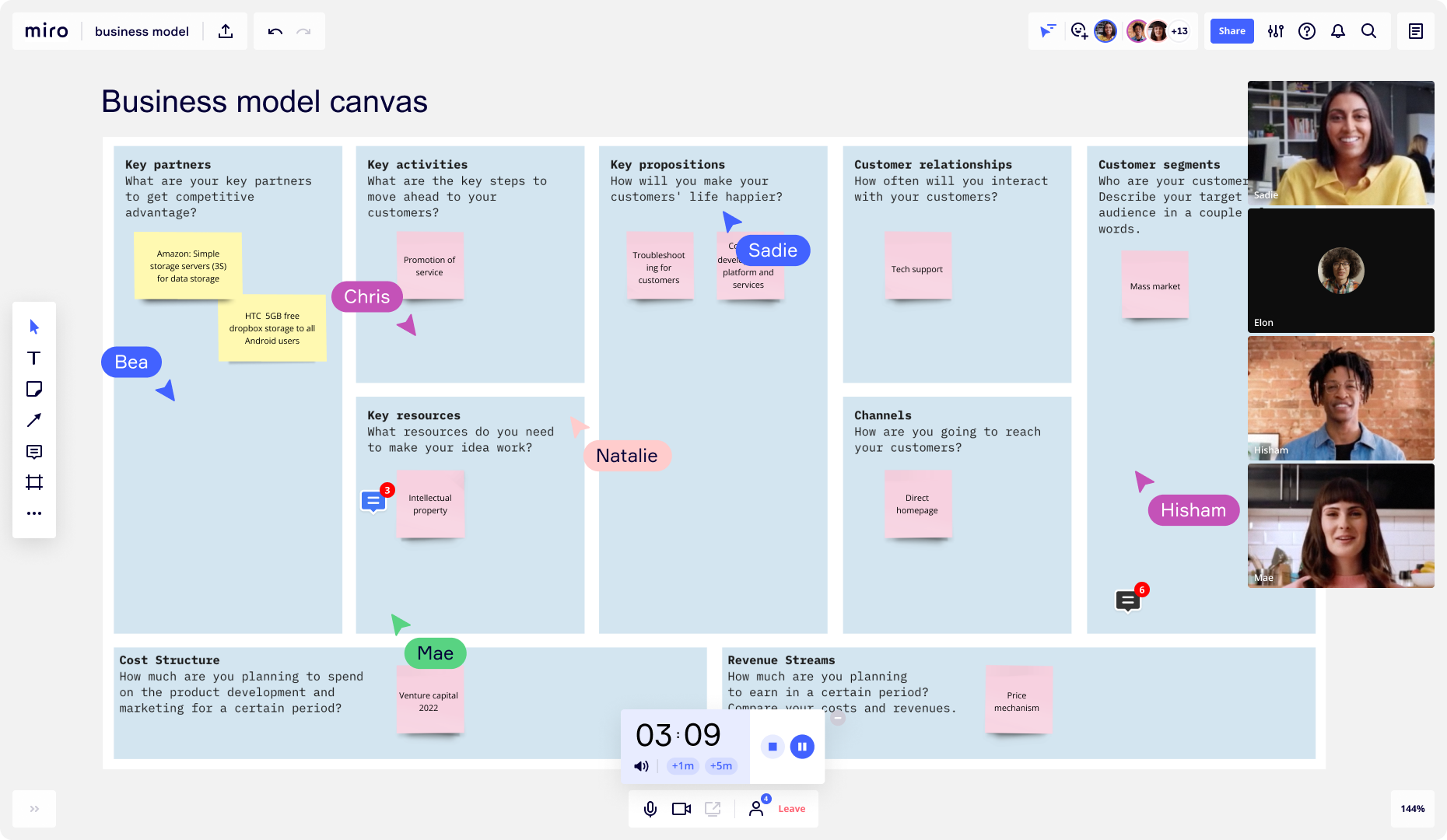
Table of Contents
How to make a good business plan: step-by-step guide.
A business plan is a strategic roadmap used to navigate the challenging journey of entrepreneurship. It's the foundation upon which you build a successful business.
A well-crafted business plan can help you define your vision, clarify your goals, and identify potential problems before they arise.
But where do you start? How do you create a business plan that sets you up for success?
This article will explore the step-by-step process of creating a comprehensive business plan.
What is a business plan?
A business plan is a formal document that outlines a business's objectives, strategies, and operational procedures. It typically includes the following information about a company:
Products or services
Target market
Competitors
Marketing and sales strategies
Financial plan
Management team
A business plan serves as a roadmap for a company's success and provides a blueprint for its growth and development. It helps entrepreneurs and business owners organize their ideas, evaluate the feasibility, and identify potential challenges and opportunities.
As well as serving as a guide for business owners, a business plan can attract investors and secure funding. It demonstrates the company's understanding of the market, its ability to generate revenue and profits, and its strategy for managing risks and achieving success.
Business plan vs. business model canvas
A business plan may seem similar to a business model canvas, but each document serves a different purpose.
A business model canvas is a high-level overview that helps entrepreneurs and business owners quickly test and iterate their ideas. It is often a one-page document that briefly outlines the following:
Key partnerships
Key activities
Key propositions
Customer relationships
Customer segments
Key resources
Cost structure
Revenue streams
On the other hand, a Business Plan Template provides a more in-depth analysis of a company's strategy and operations. It is typically a lengthy document and requires significant time and effort to develop.
A business model shouldn’t replace a business plan, and vice versa. Business owners should lay the foundations and visually capture the most important information with a Business Model Canvas Template . Because this is a fast and efficient way to communicate a business idea, a business model canvas is a good starting point before developing a more comprehensive business plan.
A business plan can aim to secure funding from investors or lenders, while a business model canvas communicates a business idea to potential customers or partners.
Why is a business plan important?
A business plan is crucial for any entrepreneur or business owner wanting to increase their chances of success.
Here are some of the many benefits of having a thorough business plan.
Helps to define the business goals and objectives
A business plan encourages you to think critically about your goals and objectives. Doing so lets you clearly understand what you want to achieve and how you plan to get there.
A well-defined set of goals, objectives, and key results also provides a sense of direction and purpose, which helps keep business owners focused and motivated.
Guides decision-making
A business plan requires you to consider different scenarios and potential problems that may arise in your business. This awareness allows you to devise strategies to deal with these issues and avoid pitfalls.
With a clear plan, entrepreneurs can make informed decisions aligning with their overall business goals and objectives. This helps reduce the risk of making costly mistakes and ensures they make decisions with long-term success in mind.
Attracts investors and secures funding
Investors and lenders often require a business plan before considering investing in your business. A document that outlines the company's goals, objectives, and financial forecasts can help instill confidence in potential investors and lenders.
A well-written business plan demonstrates that you have thoroughly thought through your business idea and have a solid plan for success.
Identifies potential challenges and risks
A business plan requires entrepreneurs to consider potential challenges and risks that could impact their business. For example:
Is there enough demand for my product or service?
Will I have enough capital to start my business?
Is the market oversaturated with too many competitors?
What will happen if my marketing strategy is ineffective?
By identifying these potential challenges, entrepreneurs can develop strategies to mitigate risks and overcome challenges. This can reduce the likelihood of costly mistakes and ensure the business is well-positioned to take on any challenges.
Provides a basis for measuring success
A business plan serves as a framework for measuring success by providing clear goals and financial projections . Entrepreneurs can regularly refer to the original business plan as a benchmark to measure progress. By comparing the current business position to initial forecasts, business owners can answer questions such as:
Are we where we want to be at this point?
Did we achieve our goals?
If not, why not, and what do we need to do?
After assessing whether the business is meeting its objectives or falling short, business owners can adjust their strategies as needed.
How to make a business plan step by step
The steps below will guide you through the process of creating a business plan and what key components you need to include.
1. Create an executive summary
Start with a brief overview of your entire plan. The executive summary should cover your business plan's main points and key takeaways.
Keep your executive summary concise and clear with the Executive Summary Template . The simple design helps readers understand the crux of your business plan without reading the entire document.
2. Write your company description
Provide a detailed explanation of your company. Include information on what your company does, the mission statement, and your vision for the future.
Provide additional background information on the history of your company, the founders, and any notable achievements or milestones.
3. Conduct a market analysis
Conduct an in-depth analysis of your industry, competitors, and target market. This is best done with a SWOT analysis to identify your strengths, weaknesses, opportunities, and threats. Next, identify your target market's needs, demographics, and behaviors.
Use the Competitive Analysis Template to brainstorm answers to simple questions like:
What does the current market look like?
Who are your competitors?
What are they offering?
What will give you a competitive advantage?
Who is your target market?
What are they looking for and why?
How will your product or service satisfy a need?
These questions should give you valuable insights into the current market and where your business stands.
4. Describe your products and services
Provide detailed information about your products and services. This includes pricing information, product features, and any unique selling points.
Use the Product/Market Fit Template to explain how your products meet the needs of your target market. Describe what sets them apart from the competition.
5. Design a marketing and sales strategy
Outline how you plan to promote and sell your products. Your marketing strategy and sales strategy should include information about your:
Pricing strategy
Advertising and promotional tactics
Sales channels
The Go to Market Strategy Template is a great way to visually map how you plan to launch your product or service in a new or existing market.

6. Determine budget and financial projections
Document detailed information on your business’ finances. Describe the current financial position of the company and how you expect the finances to play out.
Some details to include in this section are:
Startup costs
Revenue projections
Profit and loss statement
Funding you have received or plan to receive
Strategy for raising funds
7. Set the organization and management structure
Define how your company is structured and who will be responsible for each aspect of the business. Use the Business Organizational Chart Template to visually map the company’s teams, roles, and hierarchy.
As well as the organization and management structure, discuss the legal structure of your business. Clarify whether your business is a corporation, partnership, sole proprietorship, or LLC.
8. Make an action plan
At this point in your business plan, you’ve described what you’re aiming for. But how are you going to get there? The Action Plan Template describes the following steps to move your business plan forward. Outline the next steps you plan to take to bring your business plan to fruition.
Types of business plans
Several types of business plans cater to different purposes and stages of a company's lifecycle. Here are some of the most common types of business plans.
Startup business plan
A startup business plan is typically an entrepreneur's first business plan. This document helps entrepreneurs articulate their business idea when starting a new business.
Not sure how to make a business plan for a startup? It’s pretty similar to a regular business plan, except the primary purpose of a startup business plan is to convince investors to provide funding for the business. A startup business plan also outlines the potential target market, product/service offering, marketing plan, and financial projections.
Strategic business plan
A strategic business plan is a long-term plan that outlines a company's overall strategy, objectives, and tactics. This type of strategic plan focuses on the big picture and helps business owners set goals and priorities and measure progress.
The primary purpose of a strategic business plan is to provide direction and guidance to the company's management team and stakeholders. The plan typically covers a period of three to five years.
Operational business plan
An operational business plan is a detailed document that outlines the day-to-day operations of a business. It focuses on the specific activities and processes required to run the business, such as:
Organizational structure
Staffing plan
Production plan
Quality control
Inventory management
Supply chain
The primary purpose of an operational business plan is to ensure that the business runs efficiently and effectively. It helps business owners manage their resources, track their performance, and identify areas for improvement.
Growth-business plan
A growth-business plan is a strategic plan that outlines how a company plans to expand its business. It helps business owners identify new market opportunities and increase revenue and profitability. The primary purpose of a growth-business plan is to provide a roadmap for the company's expansion and growth.
The 3 Horizons of Growth Template is a great tool to identify new areas of growth. This framework categorizes growth opportunities into three categories: Horizon 1 (core business), Horizon 2 (emerging business), and Horizon 3 (potential business).
One-page business plan
A one-page business plan is a condensed version of a full business plan that focuses on the most critical aspects of a business. It’s a great tool for entrepreneurs who want to quickly communicate their business idea to potential investors, partners, or employees.
A one-page business plan typically includes sections such as business concept, value proposition, revenue streams, and cost structure.
Best practices for how to make a good business plan
Here are some additional tips for creating a business plan:
Use a template
A template can help you organize your thoughts and effectively communicate your business ideas and strategies. Starting with a template can also save you time and effort when formatting your plan.
Miro’s extensive library of customizable templates includes all the necessary sections for a comprehensive business plan. With our templates, you can confidently present your business plans to stakeholders and investors.
Be practical
Avoid overestimating revenue projections or underestimating expenses. Your business plan should be grounded in practical realities like your budget, resources, and capabilities.
Be specific
Provide as much detail as possible in your business plan. A specific plan is easier to execute because it provides clear guidance on what needs to be done and how. Without specific details, your plan may be too broad or vague, making it difficult to know where to start or how to measure success.
Be thorough with your research
Conduct thorough research to fully understand the market, your competitors, and your target audience . By conducting thorough research, you can identify potential risks and challenges your business may face and develop strategies to mitigate them.
Get input from others
It can be easy to become overly focused on your vision and ideas, leading to tunnel vision and a lack of objectivity. By seeking input from others, you can identify potential opportunities you may have overlooked.
Review and revise regularly
A business plan is a living document. You should update it regularly to reflect market, industry, and business changes. Set aside time for regular reviews and revisions to ensure your plan remains relevant and effective.
Create a winning business plan to chart your path to success
Starting or growing a business can be challenging, but it doesn't have to be. Whether you're a seasoned entrepreneur or just starting, a well-written business plan can make or break your business’ success.
The purpose of a business plan is more than just to secure funding and attract investors. It also serves as a roadmap for achieving your business goals and realizing your vision. With the right mindset, tools, and strategies, you can develop a visually appealing, persuasive business plan.
Ready to make an effective business plan that works for you? Check out our library of ready-made strategy and planning templates and chart your path to success.
Get on board in seconds
Join thousands of teams using Miro to do their best work yet.
- Search Search Please fill out this field.
What Is a Business Plan?
Understanding business plans, how to write a business plan, common elements of a business plan, how often should a business plan be updated, the bottom line, business plan: what it is, what's included, and how to write one.
Adam Hayes, Ph.D., CFA, is a financial writer with 15+ years Wall Street experience as a derivatives trader. Besides his extensive derivative trading expertise, Adam is an expert in economics and behavioral finance. Adam received his master's in economics from The New School for Social Research and his Ph.D. from the University of Wisconsin-Madison in sociology. He is a CFA charterholder as well as holding FINRA Series 7, 55 & 63 licenses. He currently researches and teaches economic sociology and the social studies of finance at the Hebrew University in Jerusalem.
:max_bytes(150000):strip_icc():format(webp)/adam_hayes-5bfc262a46e0fb005118b414.jpg)
- How to Start a Business: A Comprehensive Guide and Essential Steps
- How to Do Market Research, Types, and Example
- Marketing Strategy: What It Is, How It Works, How To Create One
- Marketing in Business: Strategies and Types Explained
- What Is a Marketing Plan? Types and How to Write One
- Business Development: Definition, Strategies, Steps & Skills
- Business Plan: What It Is, What's Included, and How to Write One CURRENT ARTICLE
- Small Business Development Center (SBDC): Meaning, Types, Impact
- How to Write a Business Plan for a Loan
- Business Startup Costs: It’s in the Details
- Startup Capital Definition, Types, and Risks
- Bootstrapping Definition, Strategies, and Pros/Cons
- Crowdfunding: What It Is, How It Works, and Popular Websites
- Starting a Business with No Money: How to Begin
- A Comprehensive Guide to Establishing Business Credit
- Equity Financing: What It Is, How It Works, Pros and Cons
- Best Startup Business Loans
- Sole Proprietorship: What It Is, Pros & Cons, and Differences From an LLC
- Partnership: Definition, How It Works, Taxation, and Types
- What is an LLC? Limited Liability Company Structure and Benefits Defined
- Corporation: What It Is and How to Form One
- Starting a Small Business: Your Complete How-to Guide
- Starting an Online Business: A Step-by-Step Guide
- How to Start Your Own Bookkeeping Business: Essential Tips
- How to Start a Successful Dropshipping Business: A Comprehensive Guide
A business plan is a document that details a company's goals and how it intends to achieve them. Business plans can be of benefit to both startups and well-established companies. For startups, a business plan can be essential for winning over potential lenders and investors. Established businesses can find one useful for staying on track and not losing sight of their goals. This article explains what an effective business plan needs to include and how to write one.
Key Takeaways
- A business plan is a document describing a company's business activities and how it plans to achieve its goals.
- Startup companies use business plans to get off the ground and attract outside investors.
- For established companies, a business plan can help keep the executive team focused on and working toward the company's short- and long-term objectives.
- There is no single format that a business plan must follow, but there are certain key elements that most companies will want to include.
Investopedia / Ryan Oakley
Any new business should have a business plan in place prior to beginning operations. In fact, banks and venture capital firms often want to see a business plan before they'll consider making a loan or providing capital to new businesses.
Even if a business isn't looking to raise additional money, a business plan can help it focus on its goals. A 2017 Harvard Business Review article reported that, "Entrepreneurs who write formal plans are 16% more likely to achieve viability than the otherwise identical nonplanning entrepreneurs."
Ideally, a business plan should be reviewed and updated periodically to reflect any goals that have been achieved or that may have changed. An established business that has decided to move in a new direction might create an entirely new business plan for itself.
There are numerous benefits to creating (and sticking to) a well-conceived business plan. These include being able to think through ideas before investing too much money in them and highlighting any potential obstacles to success. A company might also share its business plan with trusted outsiders to get their objective feedback. In addition, a business plan can help keep a company's executive team on the same page about strategic action items and priorities.
Business plans, even among competitors in the same industry, are rarely identical. However, they often have some of the same basic elements, as we describe below.
While it's a good idea to provide as much detail as necessary, it's also important that a business plan be concise enough to hold a reader's attention to the end.
While there are any number of templates that you can use to write a business plan, it's best to try to avoid producing a generic-looking one. Let your plan reflect the unique personality of your business.
Many business plans use some combination of the sections below, with varying levels of detail, depending on the company.
The length of a business plan can vary greatly from business to business. Regardless, it's best to fit the basic information into a 15- to 25-page document. Other crucial elements that take up a lot of space—such as applications for patents—can be referenced in the main document and attached as appendices.
These are some of the most common elements in many business plans:
- Executive summary: This section introduces the company and includes its mission statement along with relevant information about the company's leadership, employees, operations, and locations.
- Products and services: Here, the company should describe the products and services it offers or plans to introduce. That might include details on pricing, product lifespan, and unique benefits to the consumer. Other factors that could go into this section include production and manufacturing processes, any relevant patents the company may have, as well as proprietary technology . Information about research and development (R&D) can also be included here.
- Market analysis: A company needs to have a good handle on the current state of its industry and the existing competition. This section should explain where the company fits in, what types of customers it plans to target, and how easy or difficult it may be to take market share from incumbents.
- Marketing strategy: This section can describe how the company plans to attract and keep customers, including any anticipated advertising and marketing campaigns. It should also describe the distribution channel or channels it will use to get its products or services to consumers.
- Financial plans and projections: Established businesses can include financial statements, balance sheets, and other relevant financial information. New businesses can provide financial targets and estimates for the first few years. Your plan might also include any funding requests you're making.
The best business plans aren't generic ones created from easily accessed templates. A company should aim to entice readers with a plan that demonstrates its uniqueness and potential for success.
2 Types of Business Plans
Business plans can take many forms, but they are sometimes divided into two basic categories: traditional and lean startup. According to the U.S. Small Business Administration (SBA) , the traditional business plan is the more common of the two.
- Traditional business plans : These plans tend to be much longer than lean startup plans and contain considerably more detail. As a result they require more work on the part of the business, but they can also be more persuasive (and reassuring) to potential investors.
- Lean startup business plans : These use an abbreviated structure that highlights key elements. These business plans are short—as short as one page—and provide only the most basic detail. If a company wants to use this kind of plan, it should be prepared to provide more detail if an investor or a lender requests it.
Why Do Business Plans Fail?
A business plan is not a surefire recipe for success. The plan may have been unrealistic in its assumptions and projections to begin with. Markets and the overall economy might change in ways that couldn't have been foreseen. A competitor might introduce a revolutionary new product or service. All of this calls for building some flexibility into your plan, so you can pivot to a new course if needed.
How frequently a business plan needs to be revised will depend on the nature of the business. A well-established business might want to review its plan once a year and make changes if necessary. A new or fast-growing business in a fiercely competitive market might want to revise it more often, such as quarterly.
What Does a Lean Startup Business Plan Include?
The lean startup business plan is an option when a company prefers to give a quick explanation of its business. For example, a brand-new company may feel that it doesn't have a lot of information to provide yet.
Sections can include: a value proposition ; the company's major activities and advantages; resources such as staff, intellectual property, and capital; a list of partnerships; customer segments; and revenue sources.
A business plan can be useful to companies of all kinds. But as a company grows and the world around it changes, so too should its business plan. So don't think of your business plan as carved in granite but as a living document designed to evolve with your business.
Harvard Business Review. " Research: Writing a Business Plan Makes Your Startup More Likely to Succeed ."
U.S. Small Business Administration. " Write Your Business Plan ."
:max_bytes(150000):strip_icc():format(webp)/GettyImages-1456193345-2cc8ef3d583f42d8a80c8e631c0b0556.jpg)
- Terms of Service
- Editorial Policy
- Privacy Policy
START YOUR ECOMMERCE BUSINESS FOR JUST $1
- Skip to primary navigation
- Skip to main content
A magazine for young entrepreneurs
The best advice in entrepreneurship
Subscribe for exclusive access, how to write a business plan (tips, templates, examples).

Written by Jesse Sumrak | May 14, 2023
Comments -->

Get real-time frameworks, tools, and inspiration to start and build your business. Subscribe here
Business plans might seem like an old-school stiff-collared practice, but they deserve a place in the startup realm, too. It’s probably not going to be the frame-worthy document you hang in the office—yet, it may one day be deserving of the privilege.
Whether you’re looking to win the heart of an angel investor or convince a bank to lend you money, you’ll need a business plan. And not just any ol’ notes and scribble on the back of a pizza box or napkin—you’ll need a professional, standardized report.
Bah. Sounds like homework, right?
Yes. Yes, it does.
However, just like bookkeeping, loan applications, and 404 redirects, business plans are an essential step in cementing your business foundation.
Don’t worry. We’ll show you how to write a business plan without boring you to tears. We’ve jam-packed this article with all the business plan examples, templates, and tips you need to take your non-existent proposal from concept to completion.
Table of Contents
What Is a Business Plan?
Tips to Make Your Small Business Plan Ironclad
How to Write a Business Plan in 6 Steps
Startup Business Plan Template
Business Plan Examples
Work on Making Your Business Plan
How to Write a Business Plan FAQs
What is a business plan why do you desperately need one.
A business plan is a roadmap that outlines:
- Who your business is, what it does, and who it serves
- Where your business is now
- Where you want it to go
- How you’re going to make it happen
- What might stop you from taking your business from Point A to Point B
- How you’ll overcome the predicted obstacles
While it’s not required when starting a business, having a business plan is helpful for a few reasons:
- Secure a Bank Loan: Before approving you for a business loan, banks will want to see that your business is legitimate and can repay the loan. They want to know how you’re going to use the loan and how you’ll make monthly payments on your debt. Lenders want to see a sound business strategy that doesn’t end in loan default.
- Win Over Investors: Like lenders, investors want to know they’re going to make a return on their investment. They need to see your business plan to have the confidence to hand you money.
- Stay Focused: It’s easy to get lost chasing the next big thing. Your business plan keeps you on track and focused on the big picture. Your business plan can prevent you from wasting time and resources on something that isn’t aligned with your business goals.
Beyond the reasoning, let’s look at what the data says:
- Simply writing a business plan can boost your average annual growth by 30%
- Entrepreneurs who create a formal business plan are 16% more likely to succeed than those who don’t
- A study looking at 65 fast-growth companies found that 71% had small business plans
- The process and output of creating a business plan have shown to improve business performance
Convinced yet? If those numbers and reasons don’t have you scrambling for pen and paper, who knows what will.
Don’t Skip: Business Startup Costs Checklist
Before we get into the nitty-gritty steps of how to write a business plan, let’s look at some high-level tips to get you started in the right direction:
Be Professional and Legit
You might be tempted to get cutesy or revolutionary with your business plan—resist the urge. While you should let your brand and creativity shine with everything you produce, business plans fall more into the realm of professional documents.
Think of your business plan the same way as your terms and conditions, employee contracts, or financial statements. You want your plan to be as uniform as possible so investors, lenders, partners, and prospective employees can find the information they need to make important decisions.
If you want to create a fun summary business plan for internal consumption, then, by all means, go right ahead. However, for the purpose of writing this external-facing document, keep it legit.
Know Your Audience
Your official business plan document is for lenders, investors, partners, and big-time prospective employees. Keep these names and faces in your mind as you draft your plan.
Think about what they might be interested in seeing, what questions they’ll ask, and what might convince (or scare) them. Cut the jargon and tailor your language so these individuals can understand.
Remember, these are busy people. They’re likely looking at hundreds of applicants and startup investments every month. Keep your business plan succinct and to the point. Include the most pertinent information and omit the sections that won’t impact their decision-making.
Invest Time Researching
You might not have answers to all the sections you should include in your business plan. Don’t skip over these!
Your audience will want:
- Detailed information about your customers
- Numbers and solid math to back up your financial claims and estimates
- Deep insights about your competitors and potential threats
- Data to support market opportunities and strategy
Your answers can’t be hypothetical or opinionated. You need research to back up your claims. If you don’t have that data yet, then invest time and money in collecting it. That information isn’t just critical for your business plan—it’s essential for owning, operating, and growing your company.
Stay Realistic
Your business may be ambitious, but reign in the enthusiasm just a teeny-tiny bit. The last thing you want to do is have an angel investor call BS and say “I’m out” before even giving you a chance.
The folks looking at your business and evaluating your plan have been around the block—they know a thing or two about fact and fiction. Your plan should be a blueprint for success. It should be the step-by-step roadmap for how you’re going from Point A to Point B.

How to Write a Business Plan—6 Essential Elements
Not every business plan looks the same, but most share a few common elements. Here’s what they typically include:
- Executive Summary
- Business Overview
- Products and Services
- Market Analysis
- Competitive Analysis
- Financial Strategy
Below, we’ll break down each of these sections in more detail.
1. Executive Summary
While your executive summary is the first page of your business plan, it’s the section you’ll write last. That’s because it summarizes your entire business plan into a succinct one-pager.
Begin with an executive summary that introduces the reader to your business and gives them an overview of what’s inside the business plan.
Your executive summary highlights key points of your plan. Consider this your elevator pitch. You want to put all your juiciest strengths and opportunities strategically in this section.
2. Business Overview
In this section, you can dive deeper into the elements of your business, including answering:
- What’s your business structure? Sole proprietorship, LLC, corporation, etc.
- Where is it located?
- Who owns the business? Does it have employees?
- What problem does it solve, and how?
- What’s your mission statement? Your mission statement briefly describes why you are in business. To write a proper mission statement, brainstorm your business’s core values and who you serve.
Don’t overlook your mission statement. This powerful sentence or paragraph could be the inspiration that drives an investor to take an interest in your business. Here are a few examples of powerful mission statements that just might give you the goosebumps:
- Patagonia: Build the best product, cause no unnecessary harm, use business to inspire and implement solutions to the environmental crisis.
- Tesla: To accelerate the world’s transition to sustainable energy.
- InvisionApp : Question Assumptions. Think Deeply. Iterate as a Lifestyle. Details, Details. Design is Everywhere. Integrity.
- TED : Spread ideas.
- Warby Parker : To offer designer eyewear at a revolutionary price while leading the way for socially conscious businesses.
3. Products and Services
As the owner, you know your business and the industry inside and out. However, whoever’s reading your document might not. You’re going to need to break down your products and services in minute detail.
For example, if you own a SaaS business, you’re going to need to explain how this business model works and what you’re selling.
You’ll need to include:
- What services you sell: Describe the services you provide and how these will help your target audience.
- What products you sell: Describe your products (and types if applicable) and how they will solve a need for your target and provide value.
- How much you charge: If you’re selling services, will you charge hourly, per project, retainer, or a mixture of all of these? If you’re selling products, what are the price ranges?
4. Market Analysis
Your market analysis essentially explains how your products and services address customer concerns and pain points. This section will include research and data on the state and direction of your industry and target market.
This research should reveal lucrative opportunities and how your business is uniquely positioned to seize the advantage. You’ll also want to touch on your marketing strategy and how it will (or does) work for your audience.
Include a detailed analysis of your target customers. This describes the people you serve and sell your product to. Be careful not to go too broad here—you don’t want to fall into the common entrepreneurial trap of trying to sell to everyone and thereby not differentiating yourself enough to survive the competition.
The market analysis section will include your unique value proposition. Your unique value proposition (UVP) is the thing that makes you stand out from your competitors. This is your key to success.
If you don’t have a UVP, you don’t have a way to take on competitors who are already in this space. Here’s an example of an ecommerce internet business plan outlining their competitive edge:
FireStarters’ competitive advantage is offering product lines that make a statement but won’t leave you broke. The major brands are expensive and not distinctive enough to satisfy the changing taste of our target customers. FireStarters offers products that are just ahead of the curve and so affordable that our customers will return to the website often to check out what’s new.
5. Competitive Analysis
Your competitive analysis examines the strengths and weaknesses of competing businesses in your market or industry. This will include direct and indirect competitors. It can also include threats and opportunities, like economic concerns or legal restraints.
The best way to sum up this section is with a classic SWOT analysis. This will explain your company’s position in relation to your competitors.
6. Financial Strategy
Your financial strategy will sum up your revenue, expenses, profit (or loss), and financial plan for the future. It’ll explain how you make money, where your cash flow goes, and how you’ll become profitable or stay profitable.
This is one of the most important sections for lenders and investors. Have you ever watched Shark Tank? They always ask about the company’s financial situation. How has it performed in the past? What’s the ongoing outlook moving forward? How does the business plan to make it happen?
Answer all of these questions in your financial strategy so that your audience doesn’t have to ask. Go ahead and include forecasts and graphs in your plan, too:
- Balance sheet: This includes your assets, liabilities, and equity.
- Profit & Loss (P&L) statement: This details your income and expenses over a given period.
- Cash flow statement: Similar to the P&L, this one will show all cash flowing into and out of the business each month.
It takes cash to change the world—lenders and investors get it. If you’re short on funding, explain how much money you’ll need and how you’ll use the capital. Where are you looking for financing? Are you looking to take out a business loan, or would you rather trade equity for capital instead?
Read More: 16 Financial Concepts Every Entrepreneur Needs to Know
Startup Business Plan Template (Copy/Paste Outline)
Ready to write your own business plan? Copy/paste the startup business plan template below and fill in the blanks.
Executive Summary Remember, do this last. Summarize who you are and your business plan in one page.
Business Overview Describe your business. What’s it do? Who owns it? How’s it structured? What’s the mission statement?
Products and Services Detail the products and services you offer. How do they work? What do you charge?
Market Analysis Write about the state of the market and opportunities. Use date. Describe your customers. Include your UVP.
Competitive Analysis Outline the competitors in your market and industry. Include threats and opportunities. Add a SWOT analysis of your business.
Financial Strategy Sum up your revenue, expenses, profit (or loss), and financial plan for the future. If you’re applying for a loan, include how you’ll use the funding to progress the business.

5 Frame-Worthy Business Plan Examples
Want to explore other templates and examples? We got you covered. Check out these 5 business plan examples you can use as inspiration when writing your plan:
- SBA Wooden Grain Toy Company
- SBA We Can Do It Consulting
- OrcaSmart Business Plan Sample
- Plum Business Plan Template
- PandaDoc Free Business Plan Templates
Get to Work on Making Your Business Plan
If you find you’re getting stuck on perfecting your document, opt for a simple one-page business plan —and then get to work. You can always polish up your official plan later as you learn more about your business and the industry.
Remember, business plans are not a requirement for starting a business—they’re only truly essential if a bank or investor is asking for it.
Ask others to review your business plan. Get feedback from other startups and successful business owners. They’ll likely be able to see holes in your planning or undetected opportunities—just make sure these individuals aren’t your competitors (or potential competitors).
Your business plan isn’t a one-and-done report—it’s a living, breathing document. You’ll make changes to it as you grow and evolve. When the market or your customers change, your plan will need to change to adapt.
That means when you’re finished with this exercise, it’s not time to print your plan out and stuff it in a file cabinet somewhere. No, it should sit on your desk as a day-to-day reference. Use it (and update it) as you make decisions about your product, customers, and financial plan.
Review your business plan frequently, update it routinely, and follow the path you’ve developed to the future you’re building.
Keep Learning: New Product Development Process in 8 Easy Steps
What financial information should be included in a business plan?
Be as detailed as you can without assuming too much. For example, include your expected revenue, expenses, profit, and growth for the future.
What are some common mistakes to avoid when writing a business plan?
The most common mistake is turning your business plan into a textbook. A business plan is an internal guide and an external pitching tool. Cut the fat and only include the most relevant information to start and run your business.
Who should review my business plan before I submit it?
Co-founders, investors, or a board of advisors. Otherwise, reach out to a trusted mentor, your local chamber of commerce, or someone you know that runs a business.
Ready to Write Your Business Plan?
Don’t let creating a business plan hold you back from starting your business. Writing documents might not be your thing—that doesn’t mean your business is a bad idea.
Let us help you get started.
Join our free training to learn how to start an online side hustle in 30 days or less. We’ll provide you with a proven roadmap for how to find, validate, and pursue a profitable business idea (even if you have zero entrepreneurial experience).
Stuck on the ideas part? No problem. When you attend the masterclass, we’ll send you a free ebook with 100 of the hottest side hustle trends right now. It’s chock full of brilliant business ideas to get you up and running in the right direction.

About Jesse Sumrak
Jesse Sumrak is a writing zealot focused on creating killer content. He’s spent almost a decade writing about startup, marketing, and entrepreneurship topics, having built and sold his own post-apocalyptic fitness bootstrapped business. A writer by day and a peak bagger by night (and early early morning), you can usually find Jesse preparing for the apocalypse on a precipitous peak somewhere in the Rocky Mountains of Colorado.
Related Posts

The Complete Guide to Getting Clients for Your Consulting Business

What’s the Most Profitable Business to Start in 2024?

9 Best Businesses You Can Start with No Money

Is Selling On Amazon Worth it? Get Your Questions Answered

8 Businesses That Make Money Right Away (In 1-3 Months or Less)

How Much To Unapologetically Charge For Public Speaking

Write the Perfect Consulting Proposal: Tools, Examples, and a Template

How to Create an Online Course That Sells in 2024

I Used this Product Launch Checklist to Start 5 Ecom Brands

How to Get Sponsored: From 0 to $50,000 in 4 Weeks

How Shay Mitchell Is Disrupting a $17B Industry

MaryRuth Ghiyam: From $700K in Debt to $100M in Revenue

His Ecommerce Funnel Generated $70M Last Year

How Do You Launch a Product?

Why Erin Deering Sold Swimwear Sensation Triangl
FREE TRAINING FROM LEGIT FOUNDERS
Actionable Strategies for Starting & Growing Any Business.
Don't Miss Out! Get Instant Access to foundr+ for Just $1!
1000+ lessons. customized learning. 30,000+ strong community..

- Offices at 409 Elm St
- Offices at 66 Hanover St
- Coworking Plan
- Dedicated Desk
- Team Suites
- 409 Elm Street, Manchester
- 66 Hanover Street, Manchester
- Try a Free Day!
(603) 668-8282
(603) 668-8282

The Importance of Developing a Business Plan
April 11, 2024
Developing a Business Plan
You already have a great business idea and a strong drive to succeed, so you may be wondering if going through the hassle of writing a formal business plan is really necessary. We are here to tell you that not only is developing a business plan important, but it is essential for success. Imagine embarking on a road trip with no GPS, roadmap or compass? A business plan serves as your business roadmap and outlines your goals, strategies, and the steps you need to take to achieve those goals. A business plan will keep you focused and provide a sense of direction for your entrepreneurial journey. It also shows the viability of your business idea to investors, should you decide to pursue financing. Here are some of the essential components that should be included in a solid business plan:

Executive Summary
One of the key pieces when developing a business plan is the Executive Summary, a concise overview of your business. This includes your mission, vision, and the need your business fills and/or problem it solves. It's essentially the elevator pitch of your venture. The executive summary should be compelling enough to grab the attention of potential investors or partners, and should convince them that your business is worth their time and money.
Market Analysis
Another important component of a business plan is the Market Analysis. This provides an in-depth understanding of your target market, including size, demographics, trends and your competition. It helps you identify opportunities and potential challenges that your business may face. By analyzing the market, you can tailor your products or services to meet the needs and preferences of your target customers, giving you a competitive edge. We’ll take a deep dive into this topic in a future blog article.
Organizational Structure
The next component of a business plan is the organizational structure and management team. This section introduces the key players in your business and outlines their roles and responsibilities. It demonstrates that you have a team capable of executing your business strategies and achieving your goals. Investors and partners want to know that you have the right people in place to optimize success.
Financial Projections

Financial projections are also essential. This includes revenue projections, estimated expenses, and cash flow expectations. It shows how your business will generate revenue and the timeline for when you expect that it will become profitable. Having a clear understanding of your financial picture, you’re able to make informed decisions and attract investors who are interested in the potential returns on their investment (ROI).
Marketing Plan
Lastly, a business plan should include within it a Marketing Plan. This outlines how you will promote your products or services, reach your target customers, and generate sales. It's important to have a well-defined plan to effectively communicate your value proposition and differentiate yourself from competitors. A solid marketing strategy can help you attract customers and build a strong brand presence in the market.
A business plan is not just a document to satisfy potential investors or partners. It's a valuable tool that helps you navigate the complex world of entrepreneurship, and should be reviewed often to make sure that you are staying on track. By having a clear plan in place, you increase your chances of success and minimize the risks associated with starting a new business. So, take the time to create a comprehensive business plan and set yourself up for a bright and prosperous future.
Creating a Marketing Plan is an important piece of developing a business plan, along with the Importance of Market Research. Our blog on The Importance of Developing a Marketing Plan covers this topic in more depth.
Red Oak Coworking Office Suites at 409 Elm Street in Manchester NH are luxury lifestyle office suites, many with floor to ceiling or oversized windows, where you can be successful and productive. Located in the heart of New Hampshire’s largest city, this location offers office suites, Team Suites, conference rooms and dedicated desks. Amenities here include a state-of-the-art fitness center, yoga studio, shared kitchen, business center, off-street parking with available EV charging stations, and a reception area with greeter.
Also available is our 66 Hanover Street location downtown, which offers a variety of workspaces ranging from private or shared offices to open space coworking desks with parking nearby. Both locations have kitchen space, free coffee, tea and filtered water, free utilities and WiFi, and janitorial services. Lounge areas and conference rooms are also available. Contact Red Oak Coworking for more information on these two great swing space options.
Table of Contents
What is a business plan, the advantages of having a business plan, the types of business plans, the key elements of a business plan, best business plan software, common challenges of writing a business plan, become an expert business planner, business planning: it’s importance, types and key elements.

Every year, thousands of new businesses see the light of the day. One look at the World Bank's Entrepreneurship Survey and database shows the mind-boggling rate of new business registrations. However, sadly, only a tiny percentage of them have a chance of survival.
According to the Bureau of Labor Statistics, about 20% of small businesses fail in their first year, about 50% in their fifth year.
Research from the University of Tennessee found that 44% of businesses fail within the first three years. Among those that operate within specific sectors, like information (which includes most tech firms), 63% shut shop within three years.
Several other statistics expose the abysmal rates of business failure. But why are so many businesses bound to fail? Most studies mention "lack of business planning" as one of the reasons.
This isn’t surprising at all.
Running a business without a plan is like riding a motorcycle up a craggy cliff blindfolded. Yet, way too many firms ( a whopping 67%) don't have a formal business plan in place.
It doesn't matter if you're a startup with a great idea or a business with an excellent product. You can only go so far without a roadmap — a business plan. Only, a business plan is so much more than just a roadmap. A solid plan allows a business to weather market challenges and pivot quickly in the face of crisis, like the one global businesses are struggling with right now, in the post-pandemic world.
But before you can go ahead and develop a great business plan, you need to know the basics. In this article, we'll discuss the fundamentals of business planning to help you plan effectively for 2021.
Now before we begin with the details of business planning, let us understand what it is.
No two businesses have an identical business plan, even if they operate within the same industry. So one business plan can look entirely different from another one. Still, for the sake of simplicity, a business plan can be defined as a guide for a company to operate and achieve its goals.
More specifically, it's a document in writing that outlines the goals, objectives, and purpose of a business while laying out the blueprint for its day-to-day operations and key functions such as marketing, finance, and expansion.
A good business plan can be a game-changer for startups that are looking to raise funds to grow and scale. It convinces prospective investors that the venture will be profitable and provides a realistic outlook on how much profit is on the cards and by when it will be attained.
However, it's not only new businesses that greatly benefit from a business plan. Well-established companies and large conglomerates also need to tweak their business plans to adapt to new business environments and unpredictable market changes.
Before getting into learning more about business planning, let us learn the advantages of having one.
Since a detailed business plan offers a birds-eye view of the entire framework of an establishment, it has several benefits that make it an important part of any organization. Here are few ways a business plan can offer significant competitive edge.
- Sets objectives and benchmarks: Proper planning helps a business set realistic objectives and assign stipulated time for those goals to be met. This results in long-term profitability. It also lets a company set benchmarks and Key Performance Indicators (KPIs) necessary to reach its goals.
- Maximizes resource allocation: A good business plan helps to effectively organize and allocate the company’s resources. It provides an understanding of the result of actions, such as, opening new offices, recruiting fresh staff, change in production, and so on. It also helps the business estimate the financial impact of such actions.
- Enhances viability: A plan greatly contributes towards turning concepts into reality. Though business plans vary from company to company, the blueprints of successful companies often serve as an excellent guide for nascent-stage start-ups and new entrepreneurs. It also helps existing firms to market, advertise, and promote new products and services into the market.
- Aids in decision making: Running a business involves a lot of decision making: where to pitch, where to locate, what to sell, what to charge — the list goes on. A well thought-out business plan provides an organization the ability to anticipate the curveballs that the future could throw at them. It allows them to come up with answers and solutions to these issues well in advance.
- Fix past mistakes: When businesses create plans keeping in mind the flaws and failures of the past and what worked for them and what didn’t, it can help them save time, money, and resources. Such plans that reflects the lessons learnt from the past offers businesses an opportunity to avoid future pitfalls.
- Attracts investors: A business plan gives investors an in-depth idea about the objectives, structure, and validity of a firm. It helps to secure their confidence and encourages them to invest.
Now let's look at the various types involved in business planning.
Become a Business and Leadership Professional
- Top 10 skills in demand Business Analysis As A Skill In 2020
- 14% Growth in Jobs Of Business Analysis Profile By 2028
Business Analyst
- Industry-recognized certifications from IBM and Simplilearn
- Masterclasses from IBM experts
Post Graduate Program in Business Analysis
- Certificate from Simplilearn in collaboration with Purdue University
- Become eligible to be part of the Purdue University Alumni Association
Here's what learners are saying regarding our programs:
Assistant Consultant at Tata Consultancy Services , Tata Consultancy Services
My experience with Simplilearn has been great till now. They have good materials to start with, and a wide range of courses. I have signed up for two courses with Simplilearn over the past 6 months, Data Scientist and Agile and Scrum. My experience with both is good. One unique feature I liked about Simplilearn is that they give pre-requisites that you should complete, before a live class, so that you go there fully prepared. Secondly, there support staff is superb. I believe there are two teams, to cater to the Indian and US time zones. Simplilearn gives you the most methodical and easy way to up-skill yourself. Also, when you compare the data analytics courses across the market that offer web-based tutorials, Simplilearn, scores over the rest in my opinion. Great job, Simplilearn!
I was keenly looking for a change in my domain from business consultancy to IT(Business Analytics). This Post Graduate Program in Business Analysis course helped me achieve the same. I am proficient in business analysis now and am looking for job profiles that suit my skill set.
Business plans are formulated according to the needs of a business. It can be a simple one-page document or an elaborate 40-page affair, or anything in between. While there’s no rule set in stone as to what exactly a business plan can or can’t contain, there are a few common types of business plan that nearly all businesses in existence use.
Here’s an overview of a few fundamental types of business plans.
- Start-up plan: As the name suggests, this is a documentation of the plans, structure, and objections of a new business establishments. It describes the products and services that are to be produced by the firm, the staff management, and market analysis of their production. Often, a detailed finance spreadsheet is also attached to this document for investors to determine the viability of the new business set-up.
- Feasibility plan: A feasibility plan evaluates the prospective customers of the products or services that are to be produced by a company. It also estimates the possibility of a profit or a loss of a venture. It helps to forecast how well a product will sell at the market, the duration it will require to yield results, and the profit margin that it will secure on investments.
- Expansion Plan: This kind of plan is primarily framed when a company decided to expand in terms of production or structure. It lays down the fundamental steps and guidelines with regards to internal or external growth. It helps the firm to analyze the activities like resource allocation for increased production, financial investments, employment of extra staff, and much more.
- Operations Plan: An operational plan is also called an annual plan. This details the day-to-day activities and strategies that a business needs to follow in order to materialize its targets. It outlines the roles and responsibilities of the managing body, the various departments, and the company’s employees for the holistic success of the firm.
- Strategic Plan: This document caters to the internal strategies of the company and is a part of the foundational grounds of the establishments. It can be accurately drafted with the help of a SWOT analysis through which the strengths, weaknesses, opportunities, and threats can be categorized and evaluated so that to develop means for optimizing profits.
There is some preliminary work that’s required before you actually sit down to write a plan for your business. Knowing what goes into a business plan is one of them.
Here are the key elements of a good business plan:
- Executive Summary: An executive summary gives a clear picture of the strategies and goals of your business right at the outset. Though its value is often understated, it can be extremely helpful in creating the readers’ first impression of your business. As such, it could define the opinions of customers and investors from the get-go.
- Business Description: A thorough business description removes room for any ambiguity from your processes. An excellent business description will explain the size and structure of the firm as well as its position in the market. It also describes the kind of products and services that the company offers. It even states as to whether the company is old and established or new and aspiring. Most importantly, it highlights the USP of the products or services as compared to your competitors in the market.
- Market Analysis: A systematic market analysis helps to determine the current position of a business and analyzes its scope for future expansions. This can help in evaluating investments, promotions, marketing, and distribution of products. In-depth market understanding also helps a business combat competition and make plans for long-term success.
- Operations and Management: Much like a statement of purpose, this allows an enterprise to explain its uniqueness to its readers and customers. It showcases the ways in which the firm can deliver greater and superior products at cheaper rates and in relatively less time.
- Financial Plan: This is the most important element of a business plan and is primarily addressed to investors and sponsors. It requires a firm to reveal its financial policies and market analysis. At times, a 5-year financial report is also required to be included to show past performances and profits. The financial plan draws out the current business strategies, future projections, and the total estimated worth of the firm.
The importance of business planning is it simplifies the planning of your company's finances to present this information to a bank or investors. Here are the best business plan software providers available right now:
- Business Sorter
The importance of business planning cannot be emphasized enough, but it can be challenging to write a business plan. Here are a few issues to consider before you start your business planning:
- Create a business plan to determine your company's direction, obtain financing, and attract investors.
- Identifying financial, demographic, and achievable goals is a common challenge when writing a business plan.
- Some entrepreneurs struggle to write a business plan that is concise, interesting, and informative enough to demonstrate the viability of their business idea.
- You can streamline your business planning process by conducting research, speaking with experts and peers, and working with a business consultant.
Whether you’re running your own business or in-charge of ensuring strategic performance and growth for your employer or clients, knowing the ins and outs of business planning can set you up for success.
Be it the launch of a new and exciting product or an expansion of operations, business planning is the necessity of all large and small companies. Which is why the need for professionals with superior business planning skills will never die out. In fact, their demand is on the rise with global firms putting emphasis on business analysis and planning to cope with cut-throat competition and market uncertainties.
While some are natural-born planners, most people have to work to develop this important skill. Plus, business planning requires you to understand the fundamentals of business management and be familiar with business analysis techniques . It also requires you to have a working knowledge of data visualization, project management, and monitoring tools commonly used by businesses today.
Simpliearn’s Executive Certificate Program in General Management will help you develop and hone the required skills to become an extraordinary business planner. This comprehensive general management program by IIM Indore can serve as a career catalyst, equipping professionals with a competitive edge in the ever-evolving business environment.
What Is Meant by Business Planning?
Business planning is developing a company's mission or goals and defining the strategies you will use to achieve those goals or tasks. The process can be extensive, encompassing all aspects of the operation, or it can be concrete, focusing on specific functions within the overall corporate structure.
What Are the 4 Types of Business Plans?
The following are the four types of business plans:
Operational Planning
This type of planning typically describes the company's day-to-day operations. Single-use plans are developed for events and activities that occur only once (such as a single marketing campaign). Ongoing plans include problem-solving policies, rules for specific regulations, and procedures for a step-by-step process for achieving particular goals.
Strategic Planning
Strategic plans are all about why things must occur. A high-level overview of the entire business is included in strategic planning. It is the organization's foundation and will dictate long-term decisions.
Tactical Planning
Tactical plans are about what will happen. Strategic planning is aided by tactical planning. It outlines the tactics the organization intends to employ to achieve the goals outlined in the strategic plan.
Contingency Planning
When something unexpected occurs or something needs to be changed, contingency plans are created. In situations where a change is required, contingency planning can be beneficial.
What Are the 7 Steps of a Business Plan?
The following are the seven steps required for a business plan:
Conduct Research
If your company is to run a viable business plan and attract investors, your information must be of the highest quality.
Have a Goal
The goal must be unambiguous. You will waste your time if you don't know why you're writing a business plan. Knowing also implies having a target audience for when the plan is expected to get completed.
Create a Company Profile
Some refer to it as a company profile, while others refer to it as a snapshot. It's designed to be mentally quick and digestible because it needs to stick in the reader's mind quickly since more information is provided later in the plan.
Describe the Company in Detail
Explain the company's current situation, both good and bad. Details should also include patents, licenses, copyrights, and unique strengths that no one else has.
Create a marketing plan ahead of time.
A strategic marketing plan is required because it outlines how your product or service will be communicated, delivered, and sold to customers.
Be Willing to Change Your Plan for the Sake of Your Audience
Another standard error is that people only write one business plan. Startups have several versions, just as candidates have numerous resumes for various potential employers.
Incorporate Your Motivation
Your motivation must be a compelling reason for people to believe your company will succeed in all circumstances. A mission should drive a business, not just selling, to make money. That mission is defined by your motivation as specified in your business plan.
What Are the Basic Steps in Business Planning?
These are the basic steps in business planning:
Summary and Objectives
Briefly describe your company, its objectives, and your plan to keep it running.
Services and Products
Add specifics to your detailed description of the product or service you intend to offer. Where, why, and how much you plan to sell your product or service and any special offers.
Conduct research on your industry and the ideal customers to whom you want to sell. Identify the issues you want to solve for your customers.
Operations are the process of running your business, including the people, skills, and experience required to make it successful.
How are you going to reach your target audience? How you intend to sell to them may include positioning, pricing, promotion, and distribution.
Consider funding costs, operating expenses, and projected income. Include your financial objectives and a breakdown of what it takes to make your company profitable. With proper business planning through the help of support, system, and mentorship, it is easy to start a business.
Our Business And Leadership Courses Duration And Fees
Business And Leadership Courses typically range from a few weeks to several months, with fees varying based on program and institution.
| Program Name | Duration | Fees |
|---|---|---|
| Cohort Starts: | 5 Months | € 4,500 |
| Cohort Starts: | 6 Months | € 1,990 |
| 8 Months | € 2,499 | |
| 11 Months | € 1,299 |
Get Free Certifications with free video courses
Business and Leadership
Business Analysis Basics
Data Science & Business Analytics
Business Intelligence Fundamentals
Learn from Industry Experts with free Masterclasses
Discover How AI Will Help Good Managers Become Great
Career Information Session: Find Out How to Become a Business Analyst with IIT Roorkee
The Modern Day Business Analyst Role: AI Tools and Techniques for Success
Recommended Reads
Business Intelligence Career Guide: Your Complete Guide to Becoming a Business Analyst
Corporate Succession Planning: How to Create Leaders According to the Business Need
Top Business Analyst Skills
Business Analytics Basics: A Beginner’s Guide
Financial Planning for Businesses Across the Globe
How to Become a Business Analyst
Get Affiliated Certifications with Live Class programs
- PMP, PMI, PMBOK, CAPM, PgMP, PfMP, ACP, PBA, RMP, SP, and OPM3 are registered marks of the Project Management Institute, Inc.
- Business Essentials
- Leadership & Management
- Credential of Leadership, Impact, and Management in Business (CLIMB)
- Entrepreneurship & Innovation
- Digital Transformation
- Finance & Accounting
- Business in Society
- For Organizations
- Support Portal
- Media Coverage
- Founding Donors
- Leadership Team

- Harvard Business School →
- HBS Online →
- Business Insights →
Business Insights
Harvard Business School Online's Business Insights Blog provides the career insights you need to achieve your goals and gain confidence in your business skills.
- Career Development
- Communication
- Decision-Making
- Earning Your MBA
- Negotiation
- News & Events
- Productivity
- Staff Spotlight
- Student Profiles
- Work-Life Balance
- AI Essentials for Business
- Alternative Investments
- Business Analytics
- Business Strategy
- Business and Climate Change
- Design Thinking and Innovation
- Digital Marketing Strategy
- Disruptive Strategy
- Economics for Managers
- Entrepreneurship Essentials
- Financial Accounting
- Global Business
- Launching Tech Ventures
- Leadership Principles
- Leadership, Ethics, and Corporate Accountability
- Leading Change and Organizational Renewal
- Leading with Finance
- Management Essentials
- Negotiation Mastery
- Organizational Leadership
- Power and Influence for Positive Impact
- Strategy Execution
- Sustainable Business Strategy
- Sustainable Investing
- Winning with Digital Platforms
Why Is Strategic Planning Important?

- 06 Oct 2020
Do you know what your organization’s strategy is? How much time do you dedicate to developing that strategy each month?
If your answers are on the low side, you’re not alone. According to research from Bridges Business Consultancy , 48 percent of leaders spend less than one day per month discussing strategy.
It’s no wonder, then, that 48 percent of all organizations fail to meet at least half of their strategic targets. Before an organization can reap the rewards of its business strategy, planning must take place to ensure its strategy remains agile and executable .
Here’s a look at what strategic planning is and how it can benefit your organization.
Access your free e-book today.
What Is Strategic Planning?
Strategic planning is the ongoing organizational process of using available knowledge to document a business's intended direction. This process is used to prioritize efforts, effectively allocate resources, align shareholders and employees on the organization’s goals, and ensure those goals are backed by data and sound reasoning.
It’s important to highlight that strategic planning is an ongoing process—not a one-time meeting. In the online course Disruptive Strategy , Harvard Business School Professor Clayton Christensen notes that in a study of HBS graduates who started businesses, 93 percent of those with successful strategies evolved and pivoted away from their original strategic plans.
“Most people think of strategy as an event, but that’s not the way the world works,” Christensen says. “When we run into unanticipated opportunities and threats, we have to respond. Sometimes we respond successfully; sometimes we don’t. But most strategies develop through this process. More often than not, the strategy that leads to success emerges through a process that’s at work 24/7 in almost every industry.”
Strategic planning requires time, effort, and continual reassessment. Given the proper attention, it can set your business on the right track. Here are three benefits of strategic planning.
Related: 4 Ways to Develop Your Strategic Thinking Skills
Benefits of Strategic Planning
1. create one, forward-focused vision.
Strategy touches every employee and serves as an actionable way to reach your company’s goals.
One significant benefit of strategic planning is that it creates a single, forward-focused vision that can align your company and its shareholders. By making everyone aware of your company’s goals, how and why those goals were chosen, and what they can do to help reach them, you can create an increased sense of responsibility throughout your organization.
This can also have trickle-down effects. For instance, if a manager isn’t clear on your organization’s strategy or the reasoning used to craft it, they could make decisions on a team level that counteract its efforts. With one vision to unite around, everyone at your organization can act with a broader strategy in mind.
2. Draw Attention to Biases and Flaws in Reasoning
The decisions you make come with inherent bias. Taking part in the strategic planning process forces you to examine and explain why you’re making each decision and back it up with data, projections, or case studies, thus combatting your cognitive biases.
A few examples of cognitive biases are:
- The recency effect: The tendency to select the option presented most recently because it’s fresh in your mind
- Occam’s razor bias: The tendency to assume the most obvious decision to be the best decision
- Inertia bias: The tendency to select options that allow you to think, feel, and act in familiar ways
One cognitive bias that may be more difficult to catch in the act is confirmation bias . When seeking to validate a particular viewpoint, it's the tendency to only pay attention to information that supports that viewpoint.
If you’re crafting a strategic plan for your organization and know which strategy you prefer, enlist others with differing views and opinions to help look for information that either proves or disproves the idea.
Combating biases in strategic decision-making requires effort and dedication from your entire team, and it can make your organization’s strategy that much stronger.
Related: 3 Group Decision-Making Techniques for Success
3. Track Progress Based on Strategic Goals
Having a strategic plan in place can enable you to track progress toward goals. When each department and team understands your company’s larger strategy, their progress can directly impact its success, creating a top-down approach to tracking key performance indicators (KPIs) .
By planning your company’s strategy and defining its goals, KPIs can be determined at the organizational level. These goals can then be extended to business units, departments, teams, and individuals. This ensures that every level of your organization is aligned and can positively impact your business’s KPIs and performance.
It’s important to remember that even though your strategy might be far-reaching and structured, it must remain agile. As Christensen asserts in Disruptive Strategy , a business’s strategy needs to evolve with the challenges and opportunities it encounters. Be prepared to pivot your KPIs as goals shift and communicate the reasons for change to your organization.

Improve Your Strategic Planning Skills
Strategic planning can benefit your organization’s vision, execution, and progress toward goals. If strategic planning is a skill you’d like to improve, online courses can provide the knowledge and techniques needed to lead your team and organization.
Strategy courses can range from primers on key concepts (such as Economics for Managers ), to deep-dives on strategy frameworks (such as Disruptive Strategy ), to coursework designed to help you strategize for a specific organizational goal (such as Sustainable Business Strategy ).
Learning how to craft an effective, compelling strategic plan can enable you to not only invest in your career but provide lasting value to your organization.
Do you want to formulate winning strategies for your organization? Explore our portfolio of online strategy courses and download the free flowchart to determine which is the best fit for you and your goals.

About the Author

The Business Planning Process: 6 Steps To Creating a New Plan

In this article, we will define and explain the basic business planning process to help your business move in the right direction.
What is Business Planning?
Business planning is the process whereby an organization’s leaders figure out the best roadmap for growth and document their plan for success.
The business planning process includes diagnosing the company’s internal strengths and weaknesses, improving its efficiency, working out how it will compete against rival firms in the future, and setting milestones for progress so they can be measured.
The process includes writing a new business plan. What is a business plan? It is a written document that provides an outline and resources needed to achieve success. Whether you are writing your plan from scratch, from a simple business plan template , or working with an experienced business plan consultant or writer, business planning for startups, small businesses, and existing companies is the same.
Finish Your Business Plan Today!
The best business planning process is to use our business plan template to streamline the creation of your plan: Download Growthink’s Ultimate Business Plan Template and finish your business plan & financial model in hours.
The Better Business Planning Process
The business plan process includes 6 steps as follows:
- Do Your Research
- Calculate Your Financial Forecast
- Draft Your Plan
- Revise & Proofread
- Nail the Business Plan Presentation
We’ve provided more detail for each of these key business plan steps below.
1. Do Your Research
Conduct detailed research into the industry, target market, existing customer base, competitors, and costs of the business begins the process. Consider each new step a new project that requires project planning and execution. You may ask yourself the following questions:
- What are your business goals?
- What is the current state of your business?
- What are the current industry trends?
- What is your competition doing?
There are a variety of resources needed, ranging from databases and articles to direct interviews with other entrepreneurs, potential customers, or industry experts. The information gathered during this process should be documented and organized carefully, including the source as there is a need to cite sources within your business plan.
You may also want to complete a SWOT Analysis for your own business to identify your strengths, weaknesses, opportunities, and potential risks as this will help you develop your strategies to highlight your competitive advantage.
2. Strategize
Now, you will use the research to determine the best strategy for your business. You may choose to develop new strategies or refine existing strategies that have demonstrated success in the industry. Pulling the best practices of the industry provides a foundation, but then you should expand on the different activities that focus on your competitive advantage.
This step of the planning process may include formulating a vision for the company’s future, which can be done by conducting intensive customer interviews and understanding their motivations for purchasing goods and services of interest. Dig deeper into decisions on an appropriate marketing plan, operational processes to execute your plan, and human resources required for the first five years of the company’s life.
3. Calculate Your Financial Forecast
All of the activities you choose for your strategy come at some cost and, hopefully, lead to some revenues. Sketch out the financial situation by looking at whether you can expect revenues to cover all costs and leave room for profit in the long run.
Begin to insert your financial assumptions and startup costs into a financial model which can produce a first-year cash flow statement for you, giving you the best sense of the cash you will need on hand to fund your early operations.
A full set of financial statements provides the details about the company’s operations and performance, including its expenses and profits by accounting period (quarterly or year-to-date). Financial statements also provide a snapshot of the company’s current financial position, including its assets and liabilities.
This is one of the most valued aspects of any business plan as it provides a straightforward summary of what a company does with its money, or how it grows from initial investment to become profitable.
4. Draft Your Plan
With financials more or less settled and a strategy decided, it is time to draft through the narrative of each component of your business plan . With the background work you have completed, the drafting itself should be a relatively painless process.
If you have trouble writing convincing prose, this is a time to seek the help of an experienced business plan writer who can put together the plan from this point.
5. Revise & Proofread
Revisit the entire plan to look for any ideas or wording that may be confusing, redundant, or irrelevant to the points you are making within the plan. You may want to work with other management team members in your business who are familiar with the company’s operations or marketing plan in order to fine-tune the plan.
Finally, proofread thoroughly for spelling, grammar, and formatting, enlisting the help of others to act as additional sets of eyes. You may begin to experience burnout from working on the plan for so long and have a need to set it aside for a bit to look at it again with fresh eyes.
6. Nail the Business Plan Presentation
The presentation of the business plan should succinctly highlight the key points outlined above and include additional material that would be helpful to potential investors such as financial information, resumes of key employees, or samples of marketing materials. It can also be beneficial to provide a report on past sales or financial performance and what the business has done to bring it back into positive territory.
Business Planning Process Conclusion
Every entrepreneur dreams of the day their business becomes wildly successful.
But what does that really mean? How do you know whether your idea is worth pursuing?
And how do you stay motivated when things are not going as planned? The answers to these questions can be found in your business plan. This document helps entrepreneurs make better decisions and avoid common pitfalls along the way.
Business plans are dynamic documents that can be revised and presented to different audiences throughout the course of a company’s life. For example, a business may have one plan for its initial investment proposal, another which focuses more on milestones and objectives for the first several years in existence, and yet one more which is used specifically when raising funds.
Business plans are a critical first step for any company looking to attract investors or receive grant money, as they allow a new organization to better convey its potential and business goals to those able to provide financial resources.
How to Finish Your Business Plan in 1 Day!
Don’t you wish there was a faster, easier way to finish your business plan?
With Growthink’s Ultimate Business Plan Template you can finish your plan in just 8 hours or less!
Click here to finish your business plan today.
OR, Let Us Develop Your Plan For You
Since 1999, Growthink has developed business plans for thousands of companies who have gone on to achieve tremendous success.
Click here to see how Growthink business plan consultants can create your business plan for you.
Other Helpful Business Plan Articles & Templates

The 7 Steps of the Business Planning Process: A Complete Guide

In this article, we'll provide a comprehensive guide to the seven steps of the business planning process, and discuss the role of Strikingly website builder in creating a professional business plan.
Step 1: Conducting a SWOT Analysis
The first step in the business planning process is to conduct a SWOT analysis. SWOT stands for Strengths, Weaknesses, Opportunities, and Threats. This analysis will help you understand your business's internal and external environment, and it can help you identify areas of improvement and growth.
Strengths and weaknesses refer to internal factors such as the company's resources, capabilities, and culture. Opportunities and threats are external factors such as market trends, competition, and regulations.
You can conduct a SWOT analysis by gathering information from various sources such as market research, financial statements, and feedback from customers and employees. You can also use tools such as a SWOT matrix to visualize your analysis.
What is a SWOT Analysis?
A SWOT analysis is a framework for analyzing a business's internal and external environment. The acronym SWOT stands for Strengths, Weaknesses, Opportunities, and Threats.
Strengths and weaknesses include internal factors such as the company's resources, capabilities, and culture. Opportunities and threats are external factors such as market trends, competition, and regulations.
A SWOT analysis can help businesses identify areas of improvement and growth, assess their competitive position, and make informed decisions. It can be used for various purposes, such as business planning, product development, marketing strategy, and risk management.
Importance of Conducting a SWOT Analysis
Conducting a SWOT analysis is crucial for businesses to develop a clear understanding of their internal and external environment. It can help businesses identify their strengths and weaknesses and uncover new opportunities and potential threats. By doing so, businesses can make informed decisions about their strategies, resource allocation, and risk management.
A SWOT analysis can also help businesses identify their competitive position in the market and compare themselves to their competitors. This can help businesses differentiate themselves from their competitors and develop a unique value proposition.
Example of a SWOT Analysis
Here is an example of a SWOT analysis for a fictional business that sells handmade jewelry:
- Unique and high-quality products
- Skilled and experienced craftsmen
- Strong brand reputation and customer loyalty
- Strategic partnerships with local boutiques
- Limited production capacity
- High production costs
- Limited online presence
- Limited product variety
Opportunities
- Growing demand for handmade products
- Growing interest in sustainable and eco-friendly products
- Opportunities to expand online presence and reach new customers
- Opportunities to expand product lines
- Increasing competition from online and brick-and-mortar retailers
- Fluctuating consumer trends and preferences
- Economic downturns and uncertainty
- Increased regulations and compliance requirements
This SWOT analysis can help the business identify areas for improvement and growth. For example, the business can invest in expanding its online presence, improving its production efficiency, and diversifying its product lines. The business can also leverage its strengths, such as its skilled craftsmen and strategic partnerships, to differentiate itself from its competitors and attract more customers.
Step 2: Defining Your Business Objectives
Once you have conducted a SWOT analysis, the next step is to define your business objectives. Business objectives are specific, measurable, achievable, relevant, and time-bound (SMART) goals that align with your business's mission and vision.
Your business objectives can vary depending on your industry, target audience, and resources. Examples of business objectives include increasing sales revenue, expanding into new markets, improving customer satisfaction, and reducing costs.
You can use tools such as a goal-setting worksheet or a strategic planning framework to define your business objectives. You can also seek input from your employees and stakeholders to ensure your objectives are realistic and achievable.

What is Market Research?
Market research is an integral part of the business planning process. It gathers information about a target market or industry to make informed decisions. It involves collecting and analyzing data on consumer behavior, preferences, and buying habits, as well as competitors, industry trends, and market conditions.
Market research can help businesses identify potential customers, understand their needs and preferences, and develop effective marketing strategies. It can also help businesses identify market opportunities, assess their competitive position, and make informed product development, pricing, and distribution decisions.
Importance of Market Research in Business Planning
Market research is a crucial component of the business planning process. It can help businesses identify market trends and opportunities, assess their competitive position, and make informed decisions about their marketing strategies, product development, and business operations.
By conducting market research, businesses can gain insights into their target audience's behavior and preferences, such as their purchasing habits, brand loyalty, and decision-making process. This can help businesses develop targeted marketing campaigns and create products that meet their customers' needs.
Market research can also help businesses assess their competitive position and identify gaps in the market. Businesses can differentiate themselves by analyzing their competitors' strengths and weaknesses and developing a unique value proposition.
Different Types of Market Research Methods
Businesses can use various types of market research methods, depending on their research objectives, budget, and time frame. Here are some of the most common market research methods:
Surveys are a common market research method that involves asking questions to a sample of people about their preferences, opinions, and behaviors. Surveys can be conducted through various channels like online, phone, or in-person surveys.
- Focus Groups
Focus groups are a qualitative market research method involving a small group to discuss a specific topic or product. Focus groups can provide in-depth insights into customers' attitudes and perceptions and can help businesses understand the reasoning behind their preferences and behaviors.
Interviews are a qualitative market research method that involves one-on-one conversations between a researcher and a participant. Interviews can be conducted in person, over the phone, or through video conferencing and can provide detailed insights into a participant's experiences, perceptions, and preferences.
- Observation
Observation is a market research method that involves observing customers' behavior and interactions in a natural setting such as a store or a website. Observation can provide insights into customers' decision-making processes and behavior that may not be captured through surveys or interviews.
- Secondary Research
Secondary research involves collecting data from existing sources, like industry reports, government publications, or academic journals. Secondary research can provide a broad overview of the market and industry trends and help businesses identify potential opportunities and threats.
By combining these market research methods, businesses can comprehensively understand their target market and industry and make informed decisions about their business strategy.
Step 3: Conducting Market Research
Market research should always be a part of your strategic business planning. This step gathers information about your target audience, competitors, and industry trends. This information can help you make informed decisions about your product or service offerings, pricing strategy, and marketing campaigns.

There are various market research methods, such as surveys, focus groups, and online analytics. You can also use tools like Google Trends and social media analytics to gather data about your audience's behavior and preferences.
Market research can be time-consuming and costly, but it's crucial for making informed decisions that can impact your business's success. Strikingly website builder offers built-in analytics and SEO optimization features that can help you track your website traffic and audience engagement.
Step 4: Identifying Your Target Audience
Identifying your target audience is essential in the business planning process. Your target audience is the group of people who are most likely to buy your product or service. Understanding their needs, preferences, and behaviors can help you create effective marketing campaigns and improve customer satisfaction.
You can identify your target audience by analyzing demographic, psychographic, and behavioral data. Demographic data include age, gender, income, and education level. Psychographic data includes personality traits, values, and lifestyle. Behavioral data includes buying patterns, brand loyalty, and online engagement.
Once you have identified your target audience, you can use tools such as buyer personas and customer journey maps to create a personalized and engaging customer experience. Strikingly website builder offers customizable templates and designs to help you create a visually appealing and user-friendly website for your target audience.
What is a Target Audience?
A target audience is a group most likely to be interested in and purchase a company's products or services. A target audience can be defined based on various factors such as age, gender, location, income, education, interests, and behavior.
Identifying and understanding your target audience is crucial for developing effective marketing strategies and improving customer engagement and satisfaction. By understanding your target audience's needs, preferences, and behavior, you can create products and services that meet their needs and develop targeted marketing campaigns that resonate with them.
Importance of Identifying Your Target Audience
Identifying your target audience is essential for the success of your business. By understanding your target audience's needs and preferences, you can create products and services that meet their needs and develop targeted marketing campaigns that resonate with them.
Here are reasons why identifying your target audience is important:
- Improve customer engagement. When you understand your target audience's behavior and preferences, you can create a more personalized and engaging customer experience to improve customer loyalty and satisfaction.
- Develop effective marketing strategies. Targeting your marketing efforts to your target audience creates more effective and efficient marketing campaigns that can increase brand awareness, generate leads, and drive sales.
- Improve product development. By understanding your target audience's needs and preferences, you can develop products and services that meet their specific needs and preferences, improving customer satisfaction and retention.
- Identify market opportunities. If you identify gaps in the market or untapped market segments, you can develop products and services to meet unmet needs and gain a competitive advantage.
Examples of Target Audience Segmentation
Here are some examples of target audience segmentation based on different demographic, geographic, and psychographic factors:
- Demographic segmentation. Age, gender, income, education, occupation, and marital status.
- Geographic segmentation. Location, region, climate, and population density.
- Psychographic segmentation. Personality traits, values, interests, and lifestyle.
Step 5: Developing a Marketing Plan
A marketing plan is a strategic roadmap that outlines your marketing objectives, strategies, tactics, and budget. Your marketing plan should align with your business objectives and target audience and include a mix of online and offline marketing channels.
Marketing strategies include content marketing, social media marketing, email marketing, search engine optimization (SEO), and paid advertising. Your marketing tactics can include creating blog posts, sharing social media posts, sending newsletters, optimizing your website for search engines, and running Google Ads or Facebook Ads.
To create an effective marketing plan , research your competitors, understand your target audience's behavior, and set clear objectives and metrics. You can also seek customer and employee feedback to refine your marketing strategy.
Strikingly website builder offers a variety of marketing features such as email marketing, social media integration, and SEO optimization tools. You can also use the built-in analytics dashboard to track your website's performance and monitor your marketing campaign's effectiveness.
What is a Marketing Plan?
A marketing plan is a comprehensive document that outlines a company's marketing strategy and tactics. It typically includes an analysis of the target market, a description of the product or service, an assessment of the competition, and a detailed plan for achieving marketing objectives.
A marketing plan can help businesses identify and prioritize marketing opportunities, allocate resources effectively, and measure the success of their marketing efforts. It can also provide the marketing team with a roadmap and ensure everyone is aligned with the company's marketing goals and objectives.
Importance of a Marketing Plan in Business Planning
A marketing plan is critical to business planning. It can help businesses identify their target audience, assess their competitive position, and develop effective marketing strategies and tactics.
Here are a few reasons why a marketing plan is important in business planning:
- Provides a clear direction. A marketing plan can provide a clear direction for the marketing team and ensure everyone is aligned with the company's marketing goals and objectives.
- Helps prioritize marketing opportunities. By analyzing the target market and competition, a marketing plan can help businesses identify and prioritize marketing opportunities with the highest potential for success.
- Ensures effective resource allocation. A marketing plan can help businesses allocate resources effectively and ensure that marketing efforts are focused on the most critical and impactful activities.
- Measures success. A marketing plan can provide a framework for measuring the success of marketing efforts and making adjustments as needed.
Examples of Marketing Strategies and Tactics
Here are some examples of marketing strategies and tactics that businesses can use to achieve their marketing objectives:
- Content marketing. Creating and sharing valuable and relevant content that educates and informs the target audience about the company's products or services.
- Social media marketing. Leveraging social media platforms like Facebook, Twitter, and Instagram to engage with the target audience, build brand awareness, and drive website traffic.
- Search engine optimization (SEO). Optimizing the company's website and online content to rank higher in search engine results and drive organic traffic.
- Email marketing. Sending personalized and targeted emails to the company's email list to nurture leads, promote products or services, and drive sales.
- Influencer marketing. Partnering with influencers or industry experts to promote the company's products or services and reach a wider audience.
By using a combination of these marketing strategies and tactics, businesses can develop a comprehensive and effective marketing plan that aligns with their marketing goals and objectives.
Step 6: Creating a Financial Plan
A financial plan is a detailed document that outlines your business's financial projections, budget, and cash flow. Your financial plan should include a balance sheet, income statement, and cash flow statement, and it should be based on realistic assumptions and market trends.
To create a financial plan, you should consider your revenue streams, expenses, assets, and liabilities. You should also analyze your industry's financial benchmarks and projections and seek input from financial experts or advisors.
.jpg)Image taken from Strikingly Templates
Strikingly website builder offers a variety of payment and e-commerce features, such as online payment integration and secure checkout. You can also use the built-in analytics dashboard to monitor your revenue and expenses and track your financial performance over time.
What is a Financial Plan?
A financial plan is a comprehensive document that outlines a company's financial goals and objectives and the strategies and tactics for achieving them. It typically includes a description of the company's financial situation, an analysis of revenue and expenses, and a projection of future financial performance.
A financial plan can help businesses identify potential risks and opportunities, allocate resources effectively, and measure the success of their financial efforts. It can also provide a roadmap for the finance team and ensure everyone is aligned with the company's financial goals and objectives.
Importance of Creating a Financial Plan in Business Planning
Creating a financial plan is a critical component of the business planning process. It can help businesses identify potential financial risks and opportunities, allocate resources effectively, and measure the success of their financial efforts.
Here are some reasons why creating a financial plan is important in business planning:
- Provides a clear financial direction. A financial plan can provide a clear direction for the finance team and ensure everyone is in sync with the company's financial goals and objectives.
- Helps prioritize financial opportunities. By analyzing revenue and expenses, a financial plan can help businesses identify and prioritize financial opportunities with the highest potential for success.
- Ensures effective resource allocation. A financial plan can help businesses allocate resources effectively and ensure that financial efforts are focused on the most critical and impactful activities.
- Measures success. A financial plan can provide a framework for measuring the success of financial efforts and making adjustments as needed.
Examples of Financial Statements and Projections
Here are some examples of financial statements and projections that businesses can use in their financial plan:
- Income statement. A financial statement that shows the company's revenue and expenses over a period of time, typically monthly or annually.
- Balance sheet. A financial statement shows the company's assets, liabilities, and equity at a specific time, typically at the end of a fiscal year.
- Cash flow statement. A financial statement that shows the company's cash inflows and outflows over a period of time, typically monthly or annually.
- Financial projections. Forecasts of the company's future financial performance based on assumptions and market trends. This can include revenue, expenses, profits, and cash flow projections.
Step 7: Writing Your Business Plan
The final step in the business planning process is to write your business plan. A business plan is a comprehensive document that outlines your business's mission, vision, objectives, strategies, and financial projections.
A business plan can help you clarify your business idea, assess the feasibility of your business, and secure funding from investors or lenders. It can also provide a roadmap for your business and ensure that you stay focused on your goals and objectives.
Importance of Writing a Business Plan
Writing a business plan is an essential component of the business planning process. It can help you clarify your business idea , assess the feasibility of your business, and secure funding from investors or lenders.
Here are some reasons why writing a business plan is important:
- Clarifies your business idea. Writing a business plan can help you clarify your business idea and understand your business's goals, objectives, and strategies.
- Assesses the feasibility of your business. A business plan can help you assess the feasibility of your business and identify potential risks and opportunities.
- Secures funding. A well-written business plan can help you secure funding from investors or lenders by demonstrating the potential of your business and outlining a clear path to success.
- Provides a roadmap for your business. A business plan can provide a roadmap and ensure that you stay focused on your goals and objectives.
Tips on How to Write a Successful Business Plan
Here are some tips on how to write a business plan successfully:
- Start with an executive summary. The executive summary is a brief business plan overview and should include your business idea, target market, competitive analysis, and financial projections.
- Describe your business and industry. Provide a detailed description of your business and industry, including your products or services, target market, and competitive landscape.
- Develop a marketing strategy. Outline your marketing strategy and tactics, including your target audience, pricing strategy, promotional activities, and distribution channels.
- Provide financial projections. Provide detailed financial projections, including income statements, balance sheets, and cash flow statements, as well as assumptions and risks.
- Keep it concise and clear. Keep your business plan concise and clear, and avoid using jargon or technical terms that may confuse or intimidate readers.
Role of Strikingly Website Builder in Creating a Professional Business Plan

Strikingly website builder can play a significant role in creating a professional business plan. Strikingly provides an intuitive and user-friendly platform that allows you to create a professional-looking website and online store without coding or design skills.
Using Strikingly, you can create a visually appealing business plan and present it on your website with images, graphics, and videos to enhance the reader's experience. You can also use Strikingly's built-in templates and a drag-and-drop editor to create a customized and professional-looking business plan that reflects your brand and style.
Strikingly also provides various features and tools that can help you showcase your products or services, promote your business, and engage with your target audience. These features include e-commerce functionality, social media integration, and email marketing tools.
Let’s Sum Up!
In conclusion, the 7 steps of the business planning process are essential for starting and growing a successful business. By conducting a SWOT analysis, defining your business objectives, conducting market research, identifying your target audience, developing a marketing plan, creating a financial plan, and writing your business plan, you can set a solid foundation for your business's success.
Strikingly website builder can help you throughout the business planning process by offering a variety of features such as analytics, marketing, e-commerce , and business plan templates. With Strikingly, you can create a professional and engaging website and business plan that aligns with your business objectives and target audience.
Most Viewed


Salesforce is closed for new business in your area.

IMAGES
VIDEO
COMMENTS
Build a strategy. 4. Crafts a roadmap to achieve important milestones. A business plan is like a roadmap for your business. It helps you set, track and reach business milestones. For your plan to function in this way, your business plan should first outline your company's short- and long-term goals.
Let's take a closer look at how each of the important business planning benefits can catapult your business forward: 1. Validate Your Business Idea. The process of writing your business plan will force you to ask the difficult questions about the major components of your business, including: External: industry, target market of prospective ...
To outline the importance of business plans and make the process sound less daunting, here are 10 reasons why you need one for your small business. 1. To help you with critical decisions. The primary importance of a business plan is that they help you make better decisions. Entrepreneurship is often an endless exercise in decision making and ...
A business plan gives you a tangible way of reviewing your business goals. Business plans revolve around the present and the future. When you establish your goals and put them in writing, you're more likely to reach them. A strong business plan includes these goals, and allows you to communicate them to investors and employees alike. 3.
Describe Your Services or Products. The business plan should have a section that explains the services or products that you're offering. This is the part where you can also describe how they fit ...
Business Plans and Their Financial Models Are Valuable to Angels and Venture Capitalists. Many entrepreneurs will eventually need to raise outside capital to grow and develop their businesses. In my experience, a business plan is a crucial tool in maximizing the chances of raising money from external investors.
The purpose of a business plan is to help articulate a strategy for starting your business. It also provides insight on steps to be taken, resources required for achieving your business goals and a timeline of anticipated results. In fact, businesses that plan grow 30% faster than those that don't. 1. For existing small businesses, a business ...
It's important to remember that, while many businesses create a strategic plan before launching, some business owners just jump in. ... CEOs or owners will develop a business repositioning plan. This plan will: Acknowledge the current state of the company. State a vision for the future of the company. Explain why the business needs to ...
A business plan lays out a strategic roadmap for any new or growing business. Any entrepreneur with a great idea for a business needs to conduct market research, analyze their competitors, validate their idea by talking to potential customers, and define their unique value proposition.
The steps below will guide you through the process of creating a business plan and what key components you need to include. 1. Create an executive summary. Start with a brief overview of your entire plan. The executive summary should cover your business plan's main points and key takeaways.
A business plan is essential as an entrepreneur. It helps you set clear goals and guidelines for how you will manage your business. A business plan may also be needed to set employee goals, obtain funding or even to sell your business one day. In this article, we discuss the importance of a business plan for entrepreneurs, as well as a few main ...
Business Plan: A business plan is a written document that describes in detail how a business, usually a new one, is going to achieve its goals. A business plan lays out a written plan from a ...
While these are all very important steps to take, a business plan will be central to how you start, grow and develop your business. Here are 5 reasons why you need a business plan: 1. It will help you steer your business as you start and grow. Think of a business plan as a GPS to get your business going. A good business plan guides you through ...
1. Executive Summary. While your executive summary is the first page of your business plan, it's the section you'll write last. That's because it summarizes your entire business plan into a succinct one-pager. Begin with an executive summary that introduces the reader to your business and gives them an overview of what's inside the ...
Traditional business plans use some combination of these nine sections. Executive summary. Briefly tell your reader what your company is and why it will be successful. Include your mission statement, your product or service, and basic information about your company's leadership team, employees, and location.
So, take the time to create a comprehensive business plan and set yourself up for a bright and prosperous future. Creating a Marketing Plan is an important piece of developing a business plan, along with the Importance of Market Research. Our blog on The Importance of Developing a Marketing Plan covers this topic in more depth.
A business plan is an executive document that acts as a blueprint or roadmap for a business. It is quite necessary for new ventures seeking capital, expansion activities, or projects requiring additional capital. It is also important to remind the management, employees, and partners of what they represent. You are free to use this image on your ...
While some are natural-born planners, most people have to work to develop this important skill. Plus, business planning requires you to understand the fundamentals of business management and be familiar with business analysis techniques. It also requires you to have a working knowledge of data visualization, project management, and monitoring ...
plan is much more important than attempting to reach a certain length. Elements of a Business Plan Section 1. Business Description As an introduction to your business, this section should provide an overview of the business and its objectives. Readers of your business plan will want to know why this business should exist.
Benefits of Strategic Planning. 1. Create One, Forward-Focused Vision. Strategy touches every employee and serves as an actionable way to reach your company's goals. One significant benefit of strategic planning is that it creates a single, forward-focused vision that can align your company and its shareholders.
The business plan should clearly and concisely define the mission, val-ues, strategy, measurable objectives, and key results the owner expects. It is important to set aside enough time to formulate the plan. Experts recommend starting the planning pro-cess at least 6 months before initiating a new business.
The Better Business Planning Process. The business plan process includes 6 steps as follows: Do Your Research. Strategize. Calculate Your Financial Forecast. Draft Your Plan. Revise & Proofread. Nail the Business Plan Presentation. We've provided more detail for each of these key business plan steps below.
Investors and lenders need to see a detailed plan that demonstrates your business's potential for success. A comprehensive business plan shows them that you've done your homework, understand your ...
Importance of a Marketing Plan in Business Planning. A marketing plan is critical to business planning. It can help businesses identify their target audience, assess their competitive position, and develop effective marketing strategies and tactics. Here are a few reasons why a marketing plan is important in business planning:
Sales forecasts touch virtually all departments in a business. For example, the finance department uses sales forecasts to decide how to make annual and quarterly investments. Product leaders use them to plan demand for new products. And the HR department uses forecasts to align recruiting needs to where the business is going.
Here are ten examples of professional development goals to inspire your own: 1. Develop a new skill set. Growing professionally often means expanding the arsenal of things you're able to do. What skill you choose to develop can depend on your industry, job, and personal preferences.
If 2023 was the year the world discovered generative AI (gen AI), 2024 is the year organizations truly began using—and deriving business value from—this new technology.In the latest McKinsey Global Survey on AI, 65 percent of respondents report that their organizations are regularly using gen AI, nearly double the percentage from our previous survey just ten months ago.